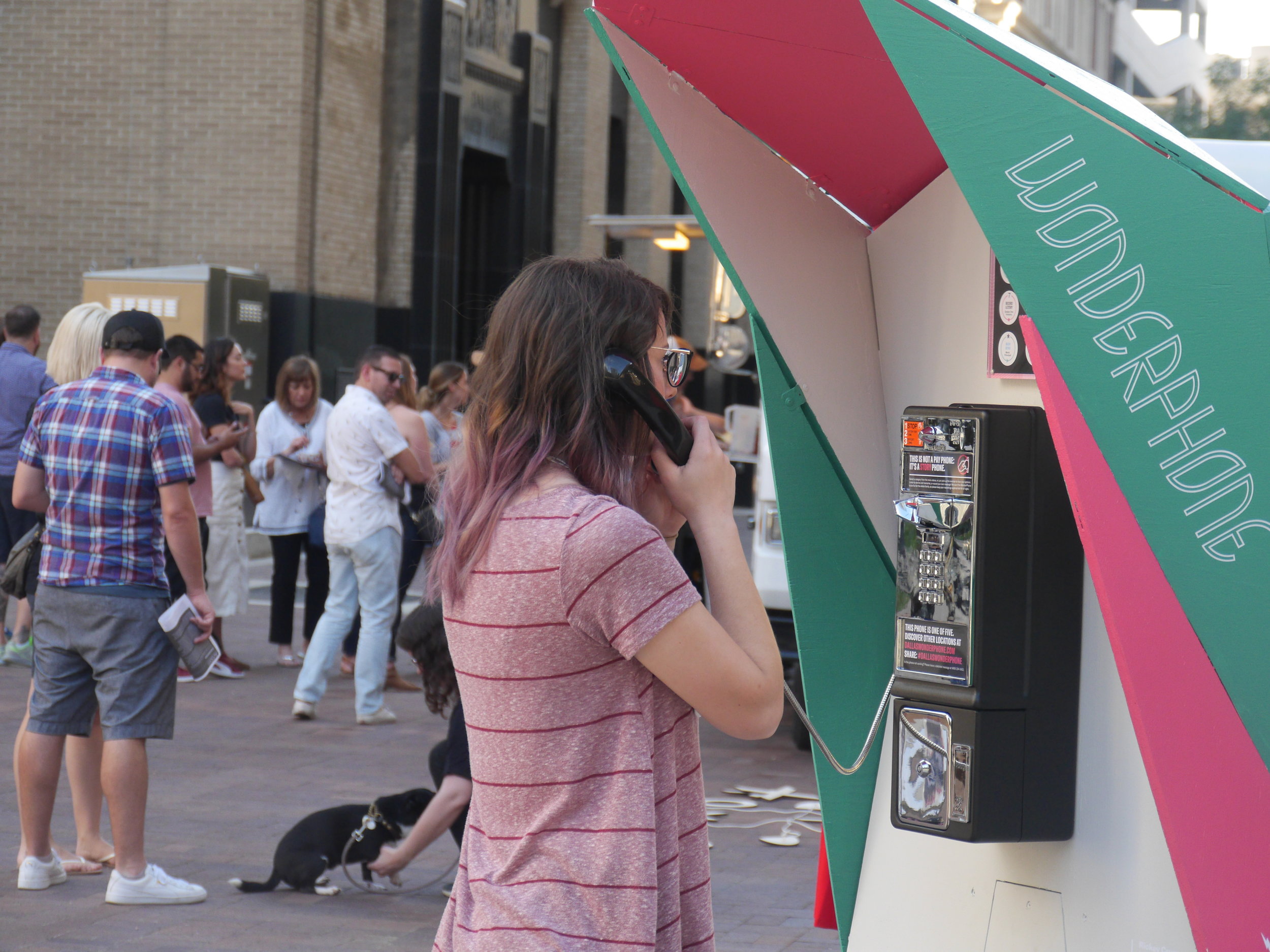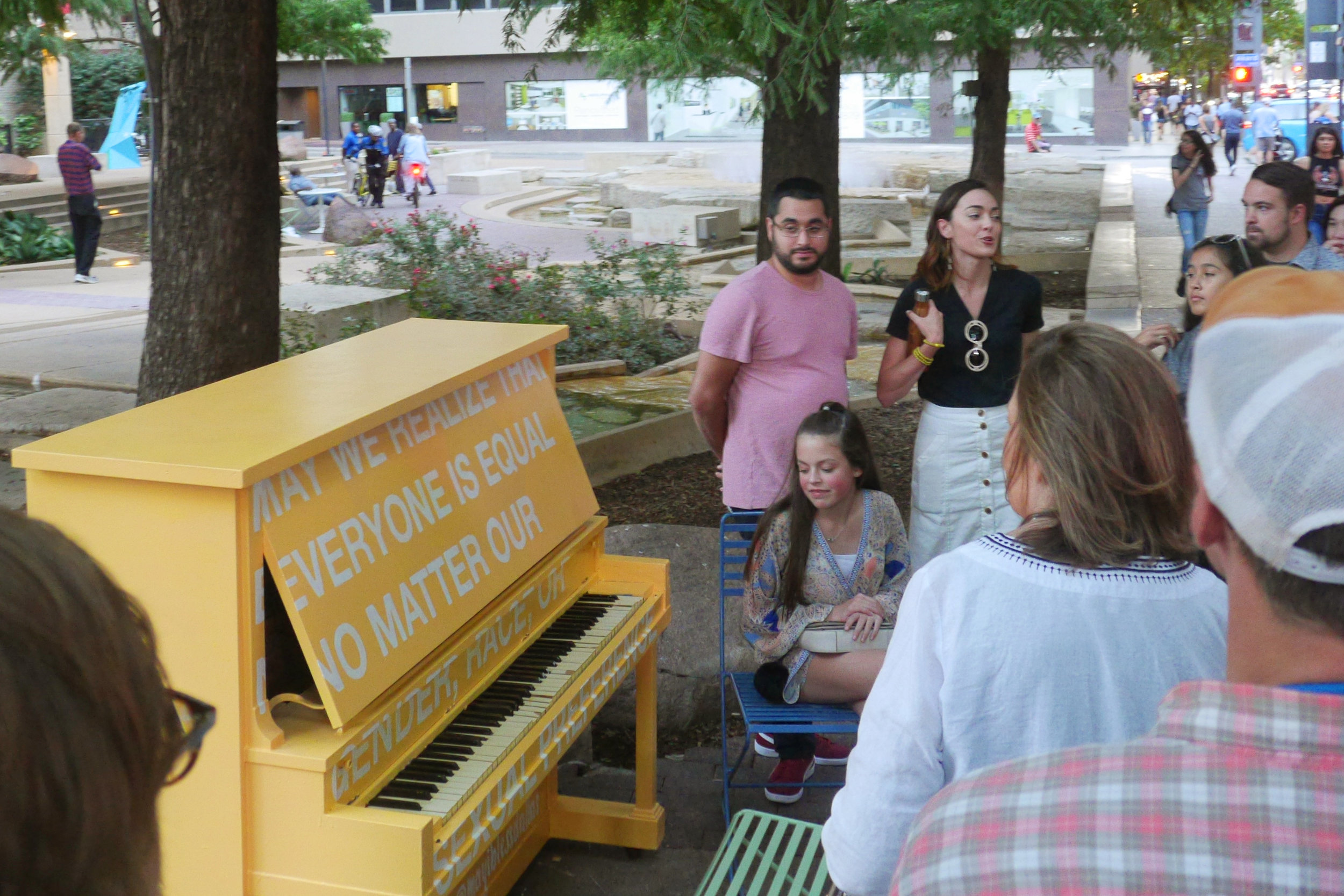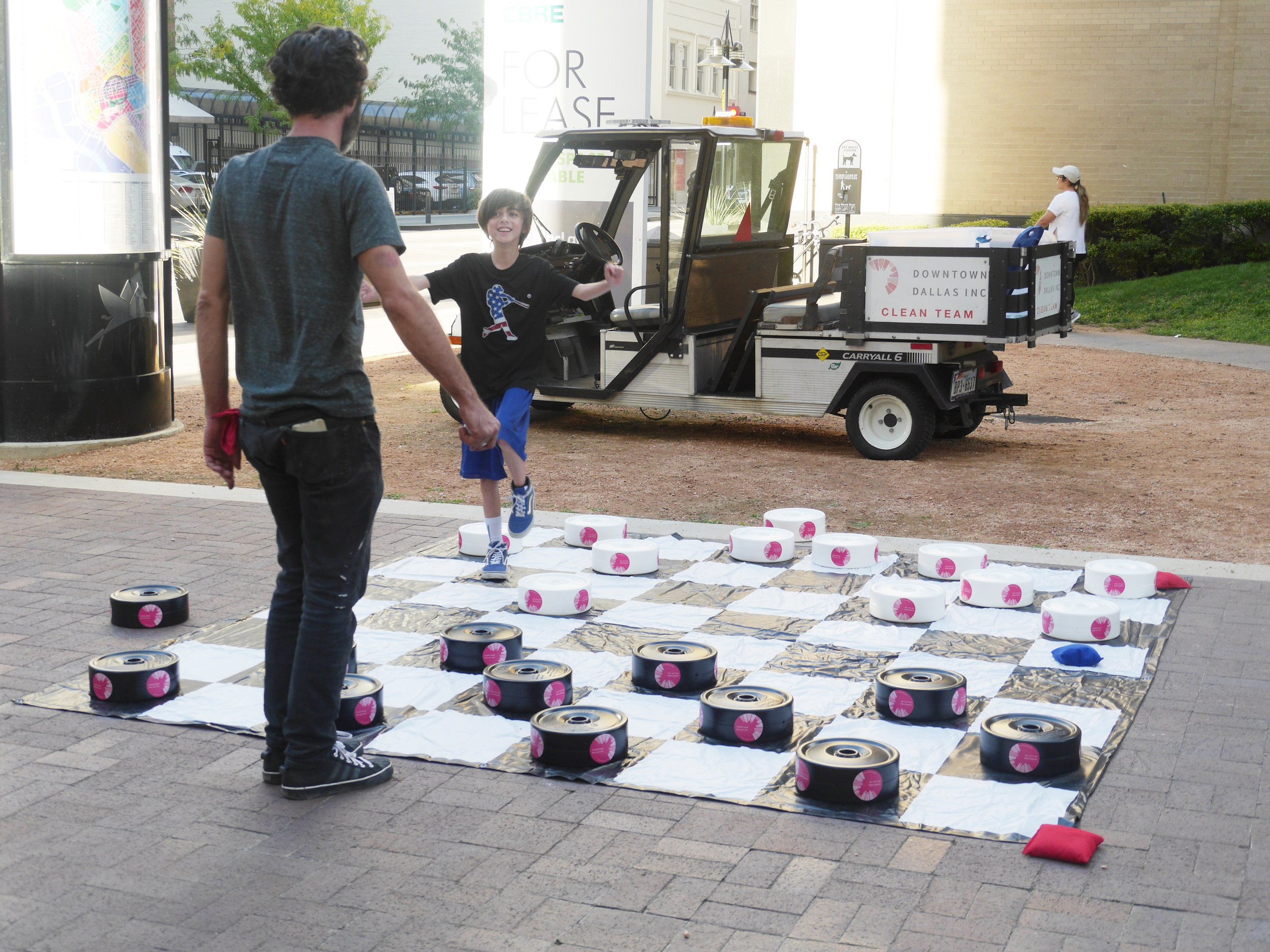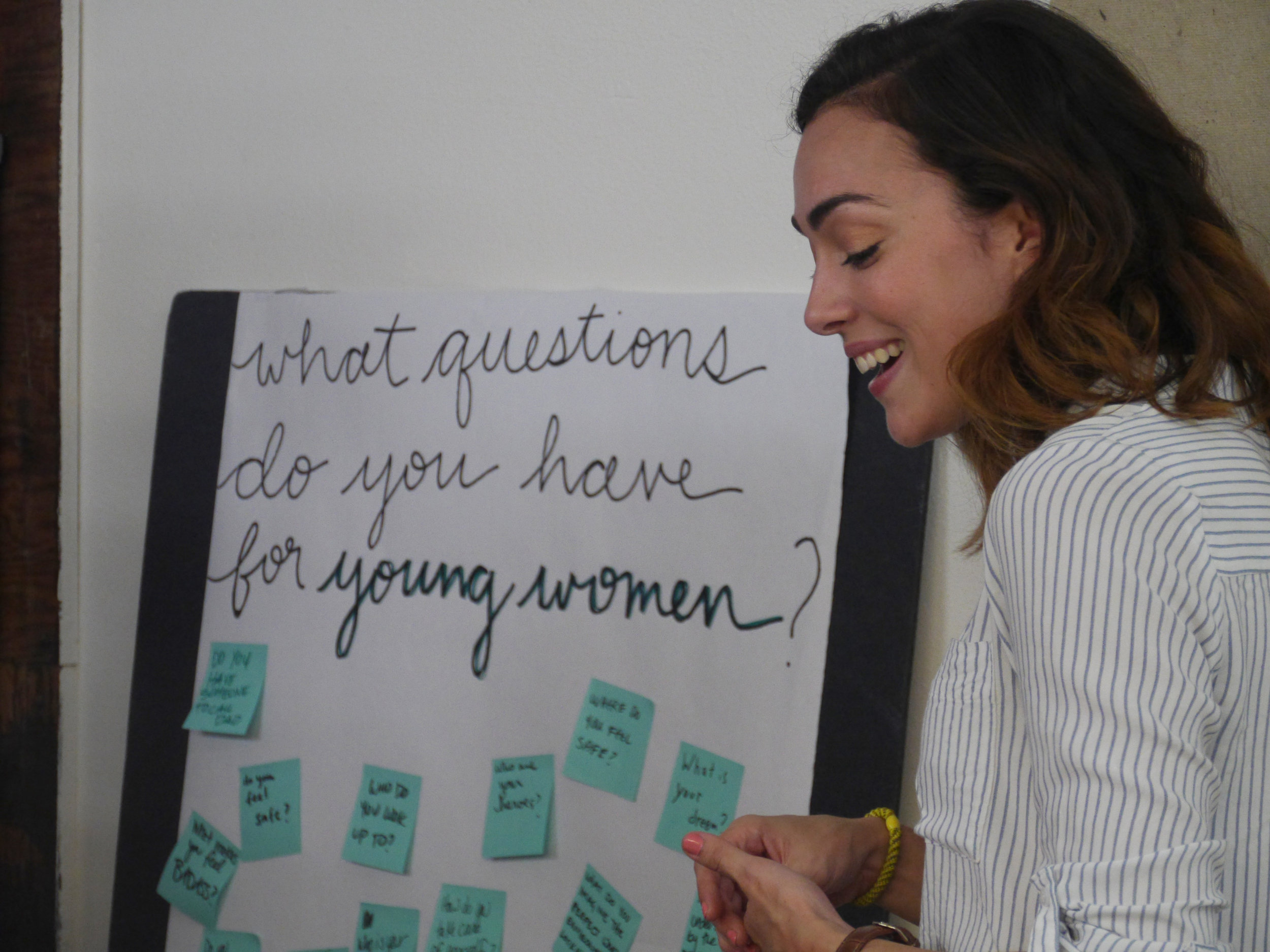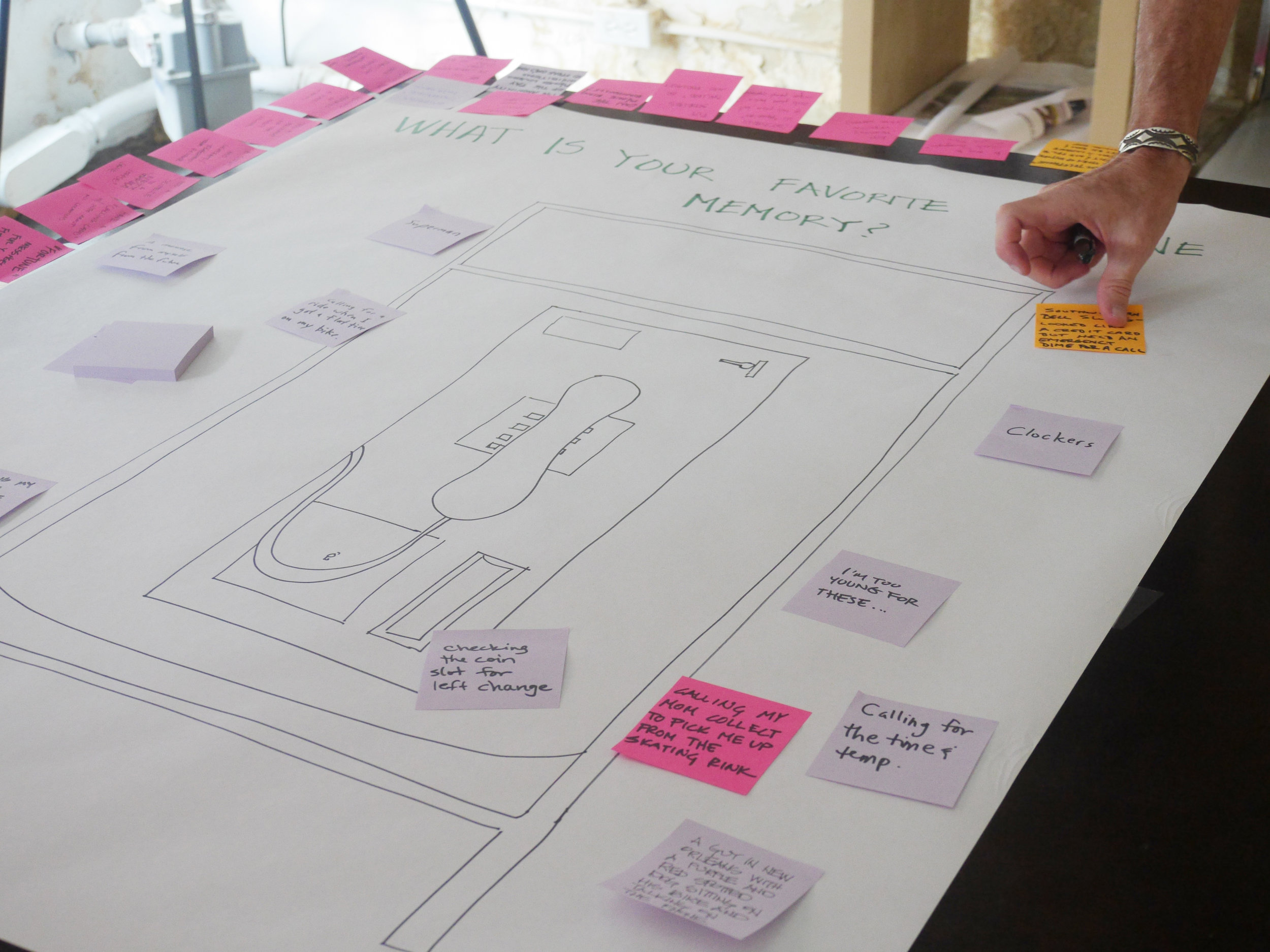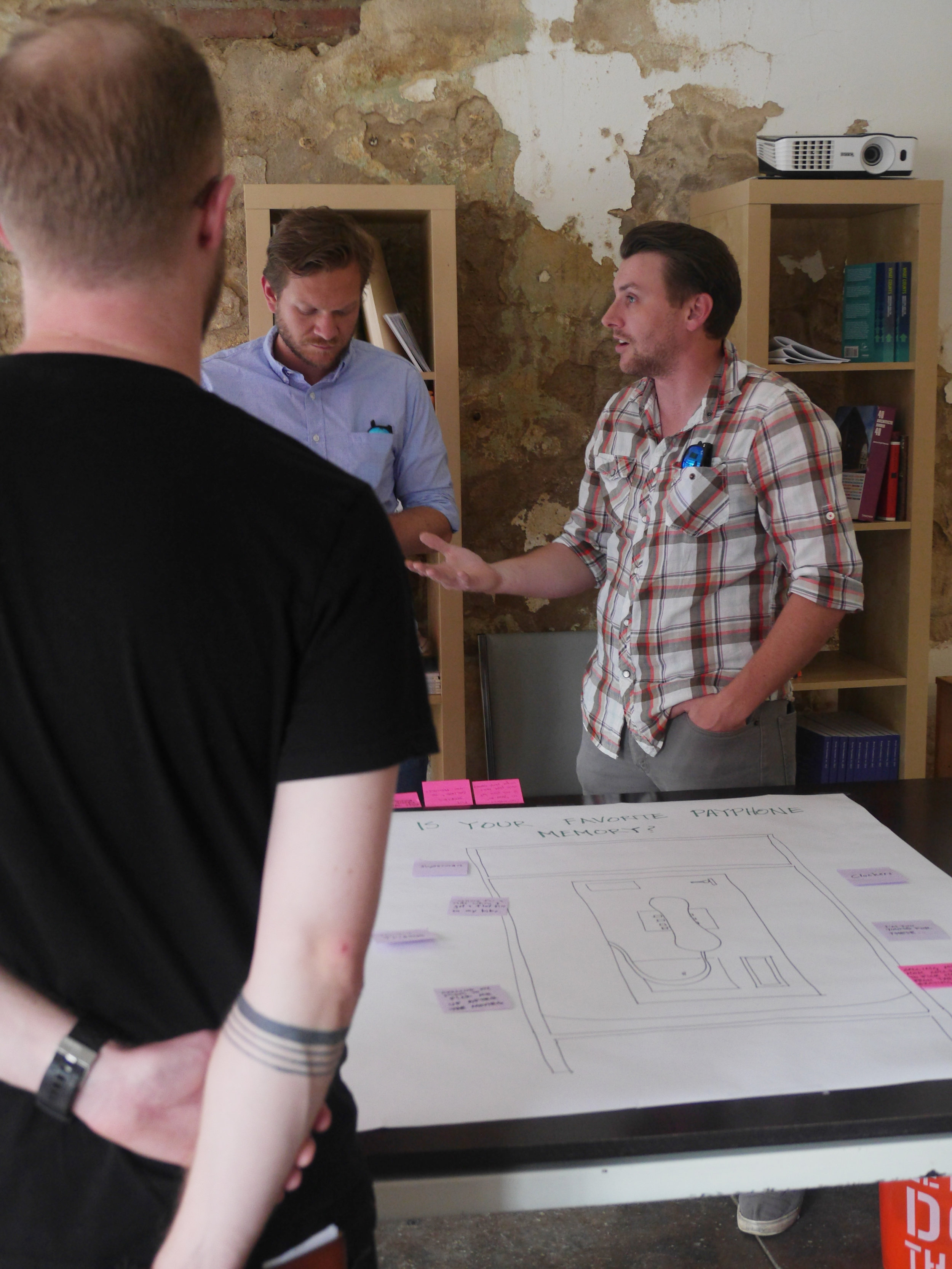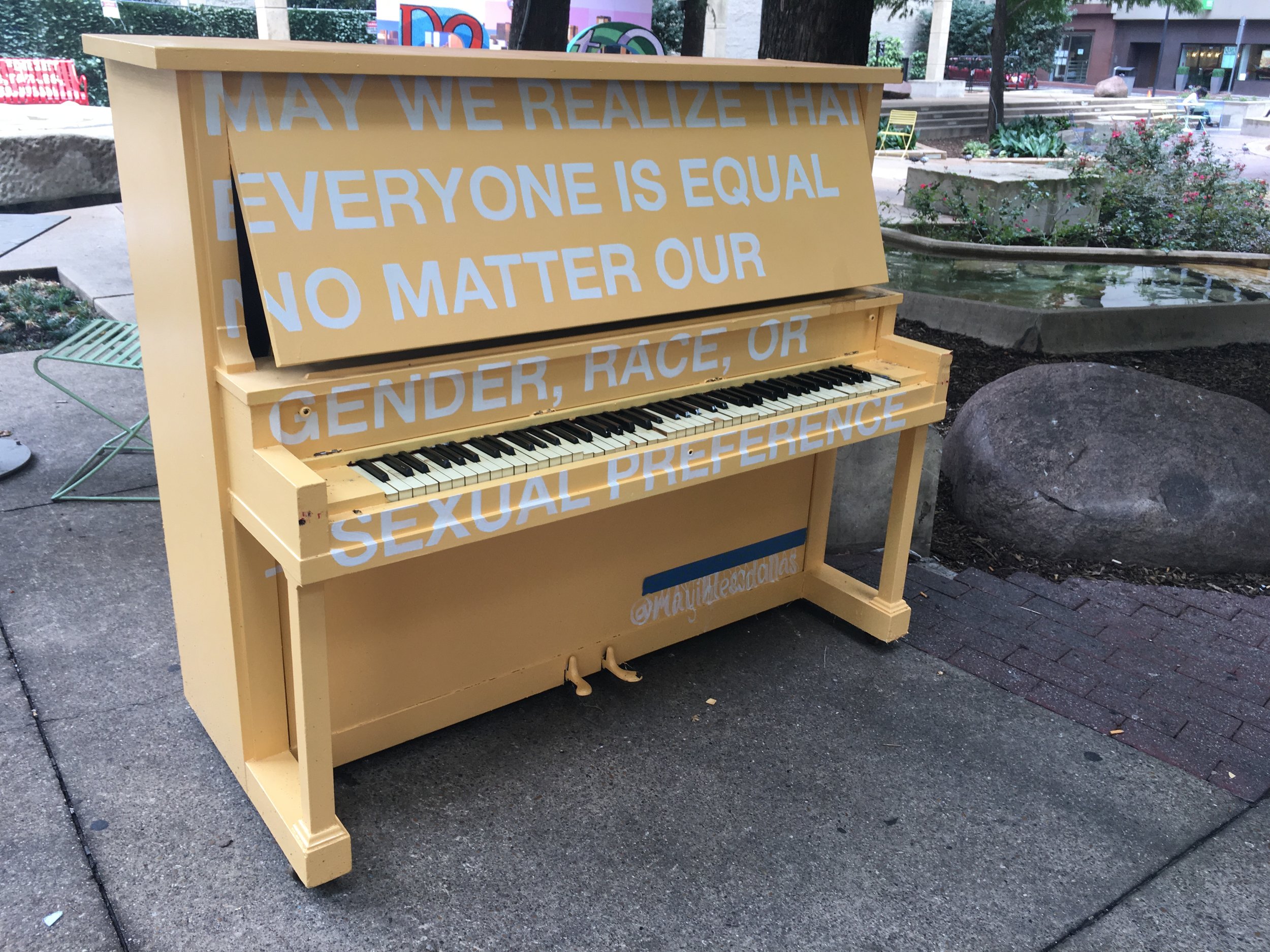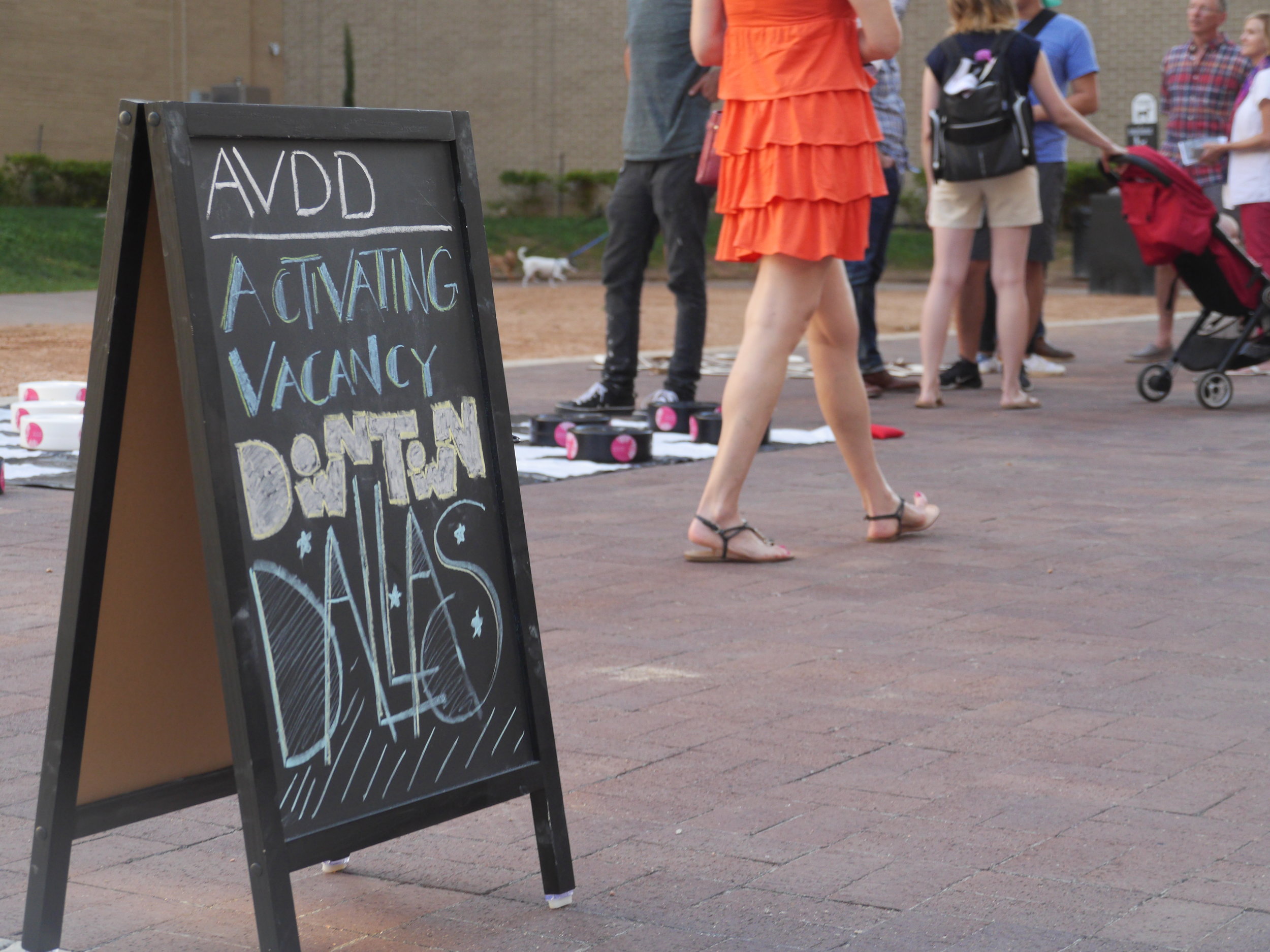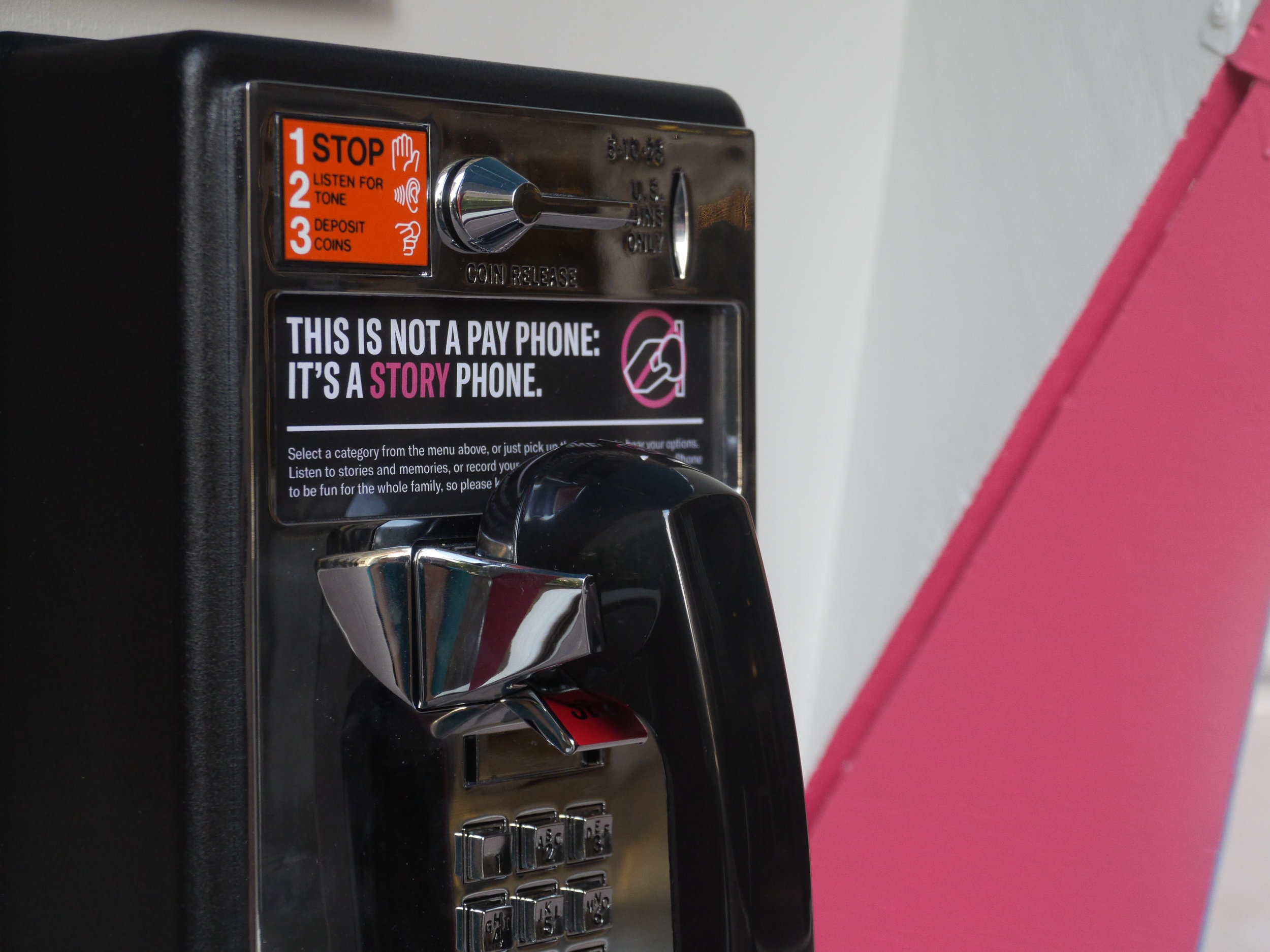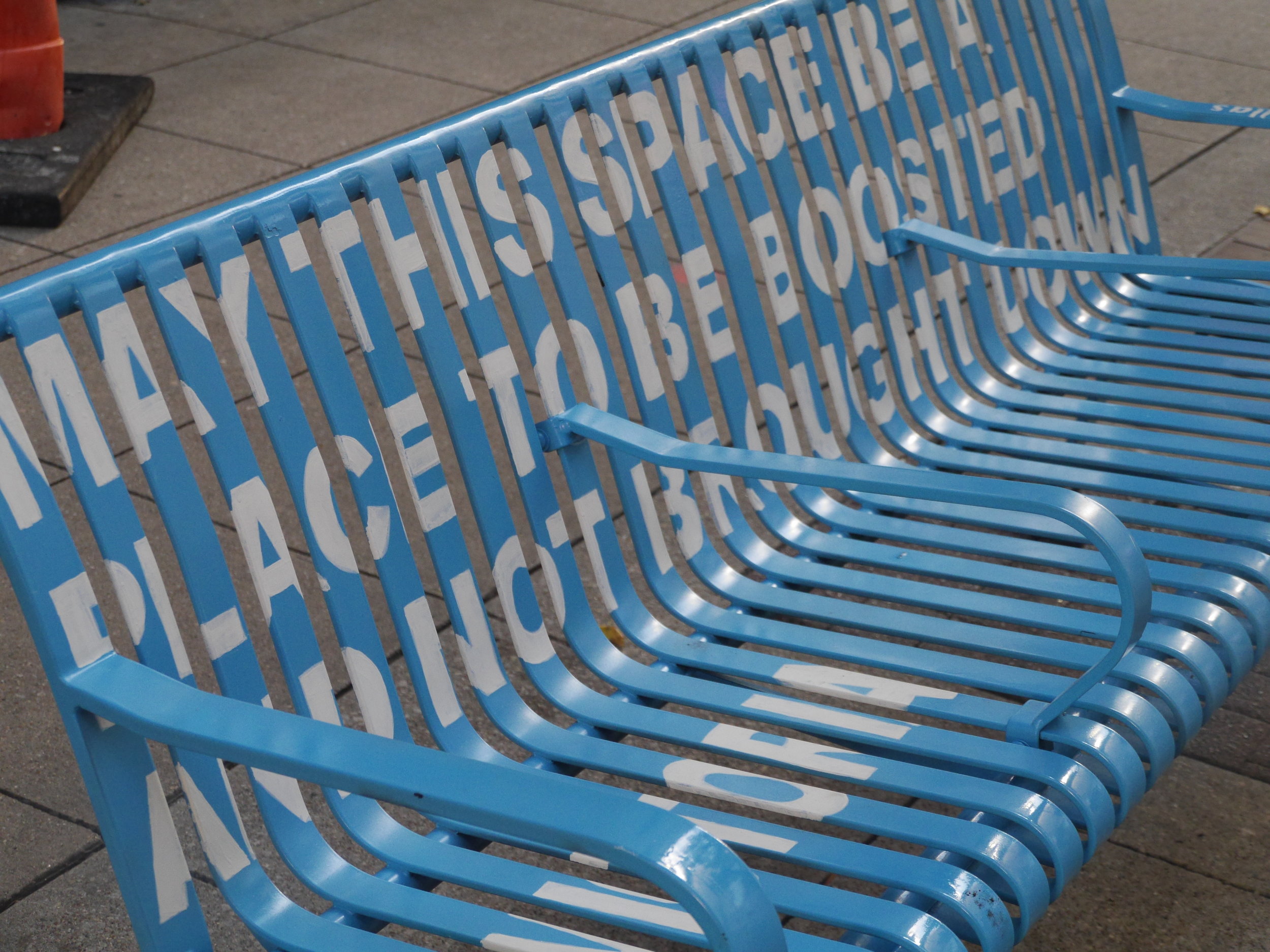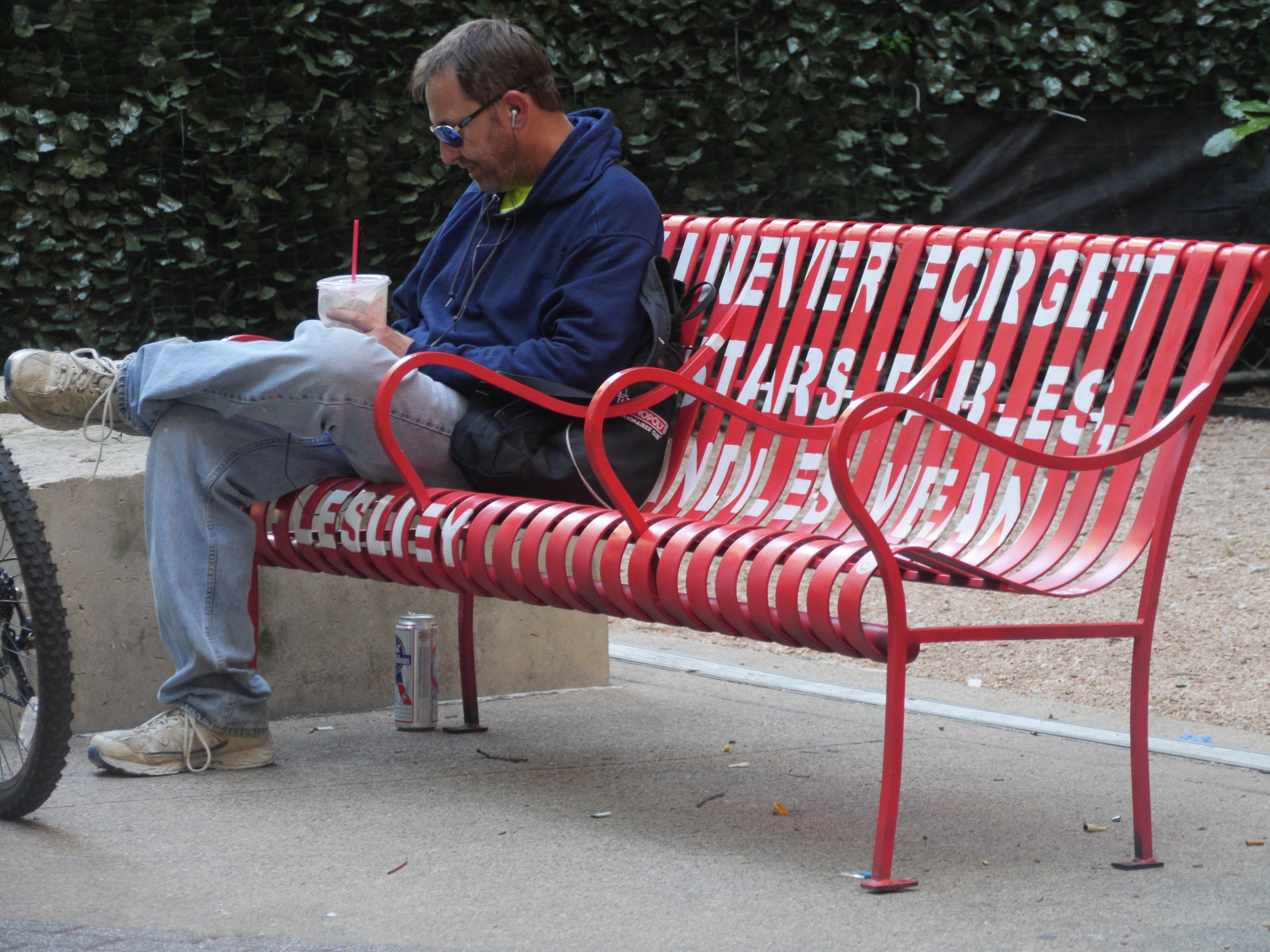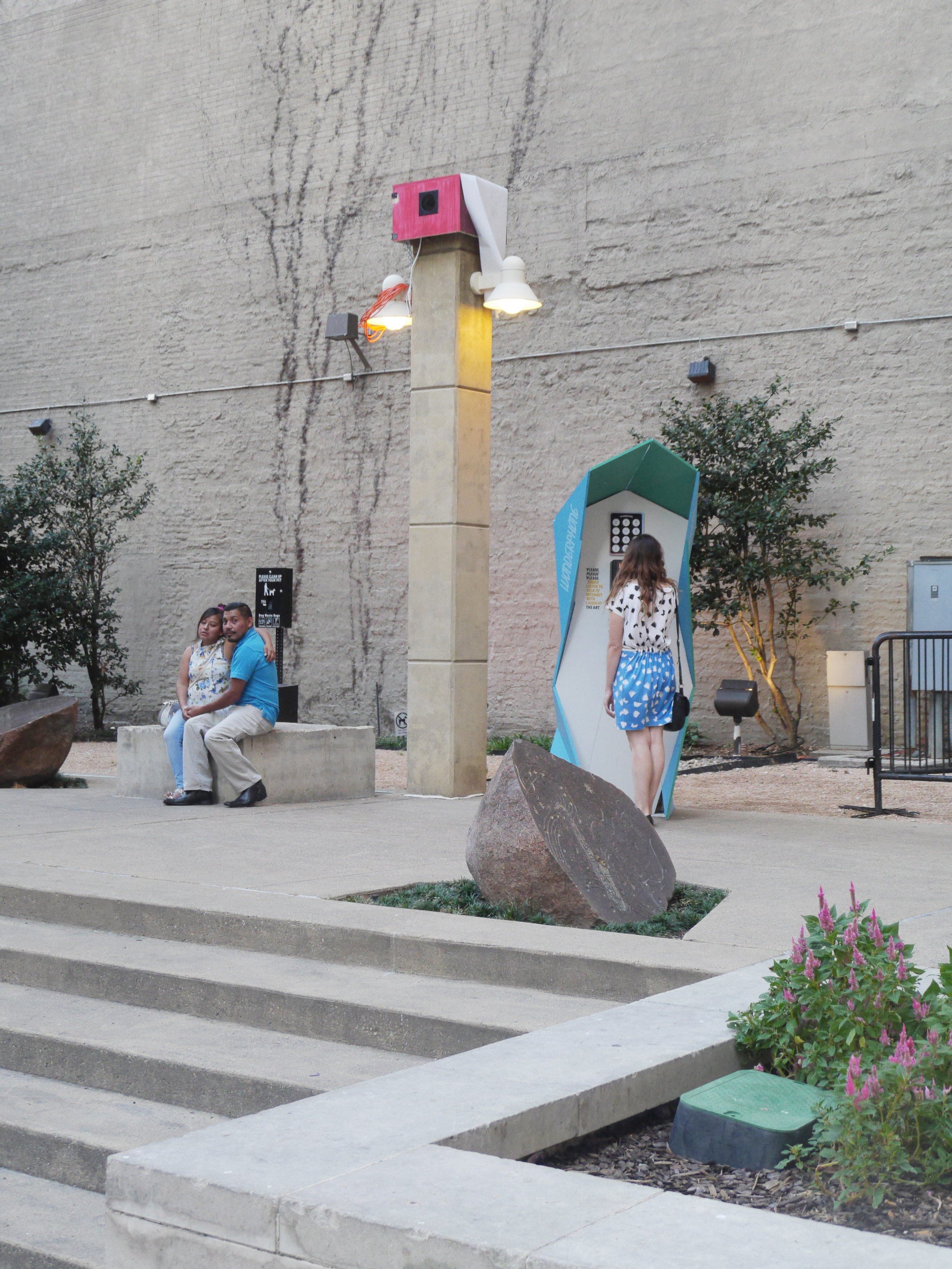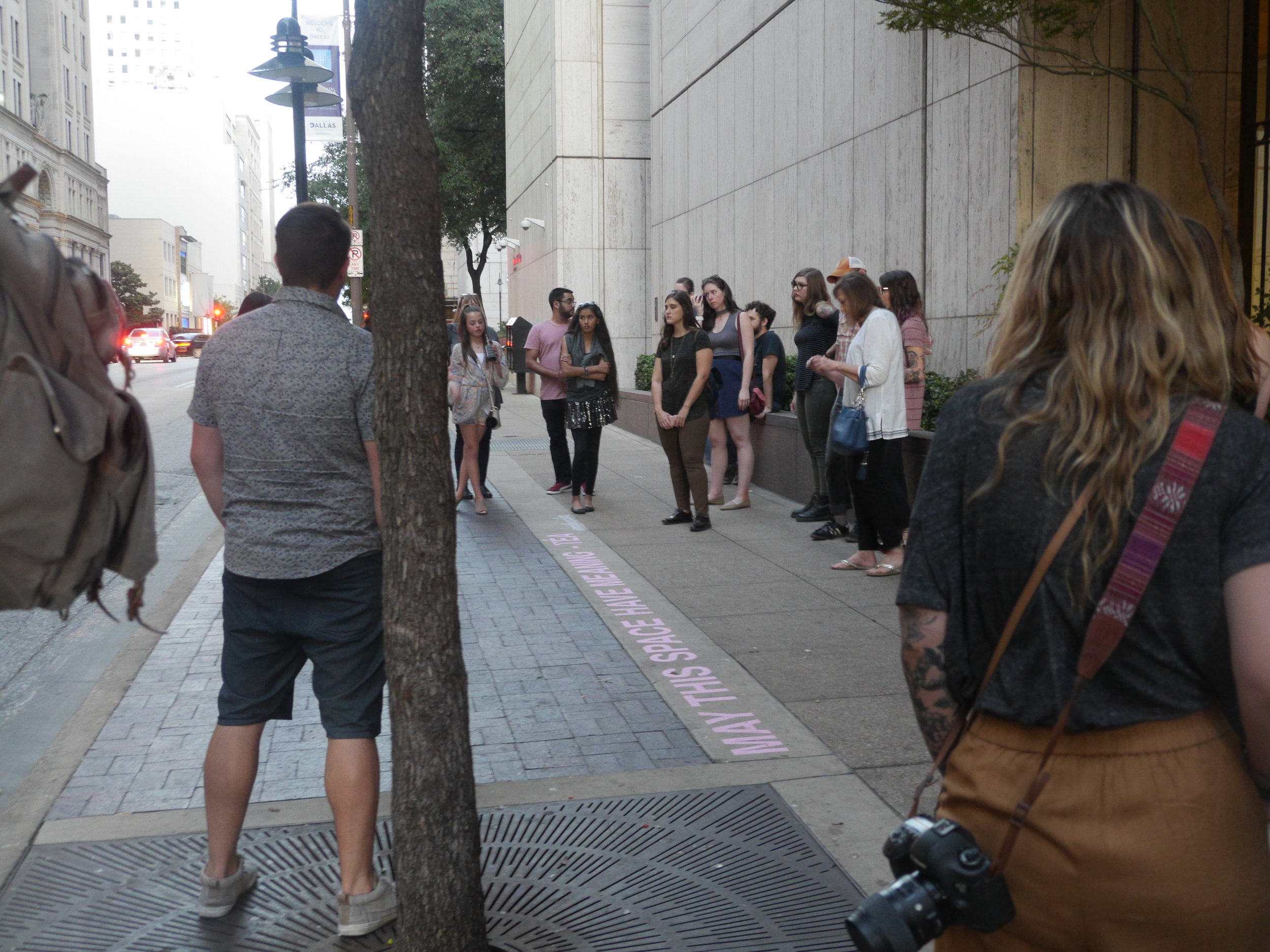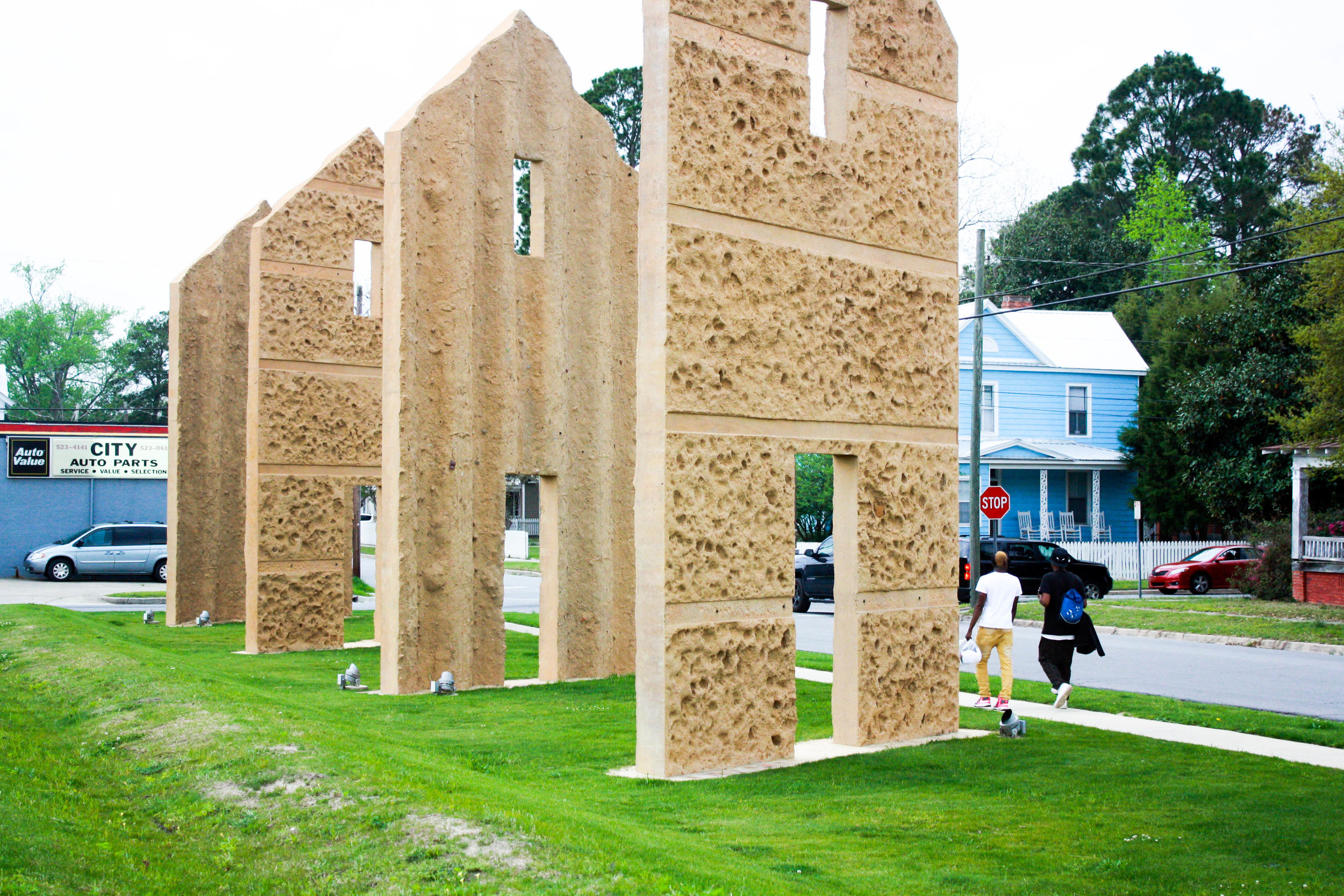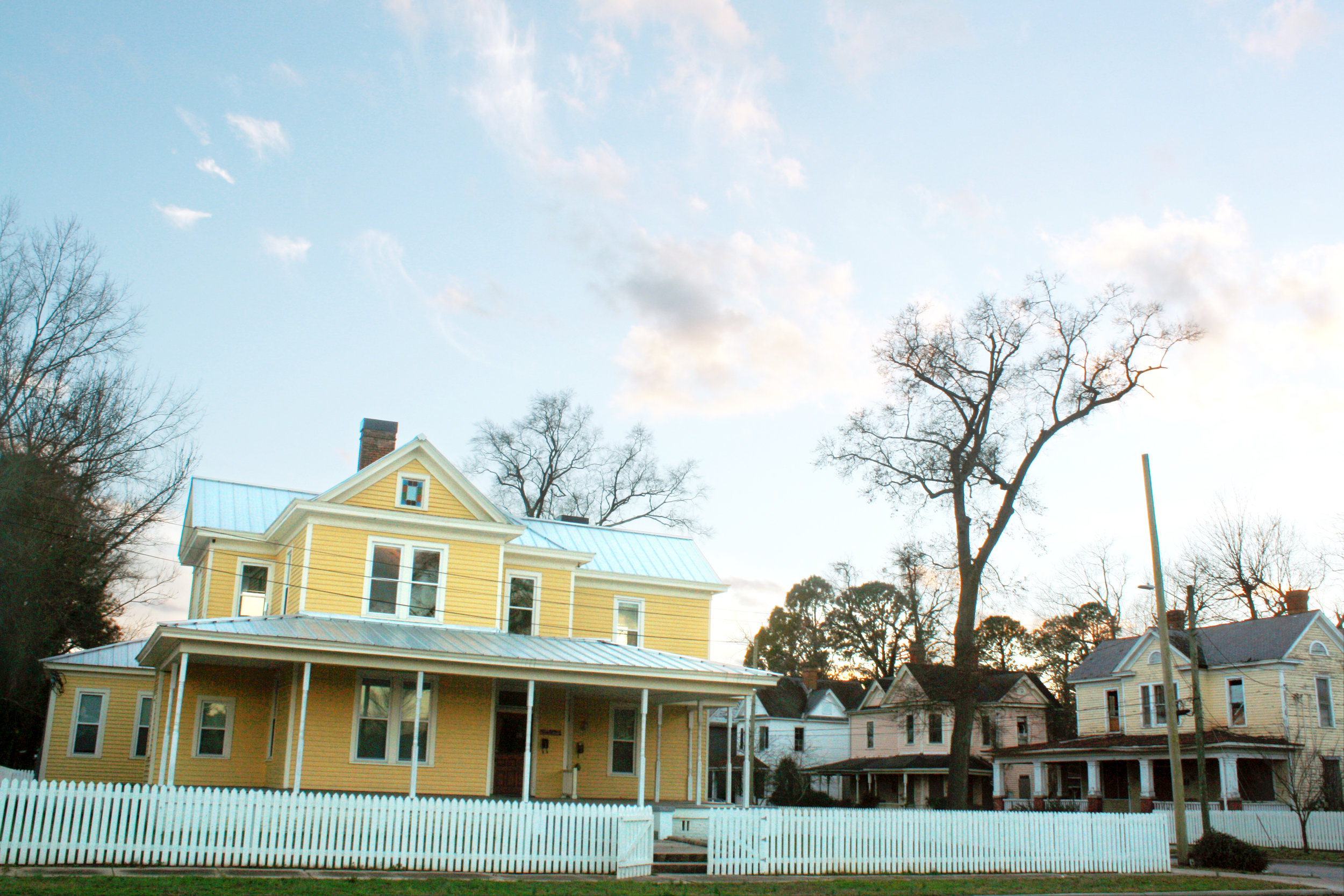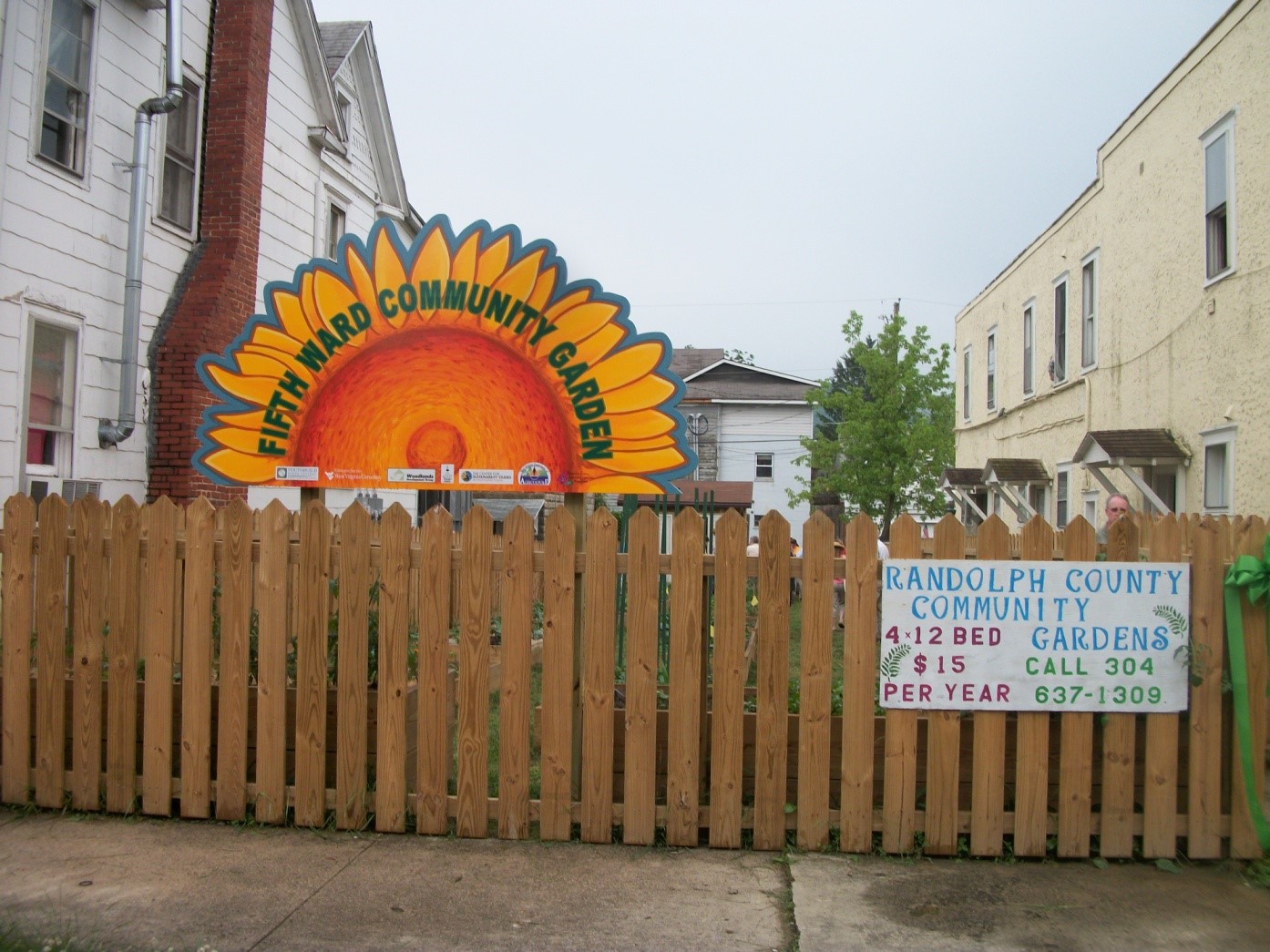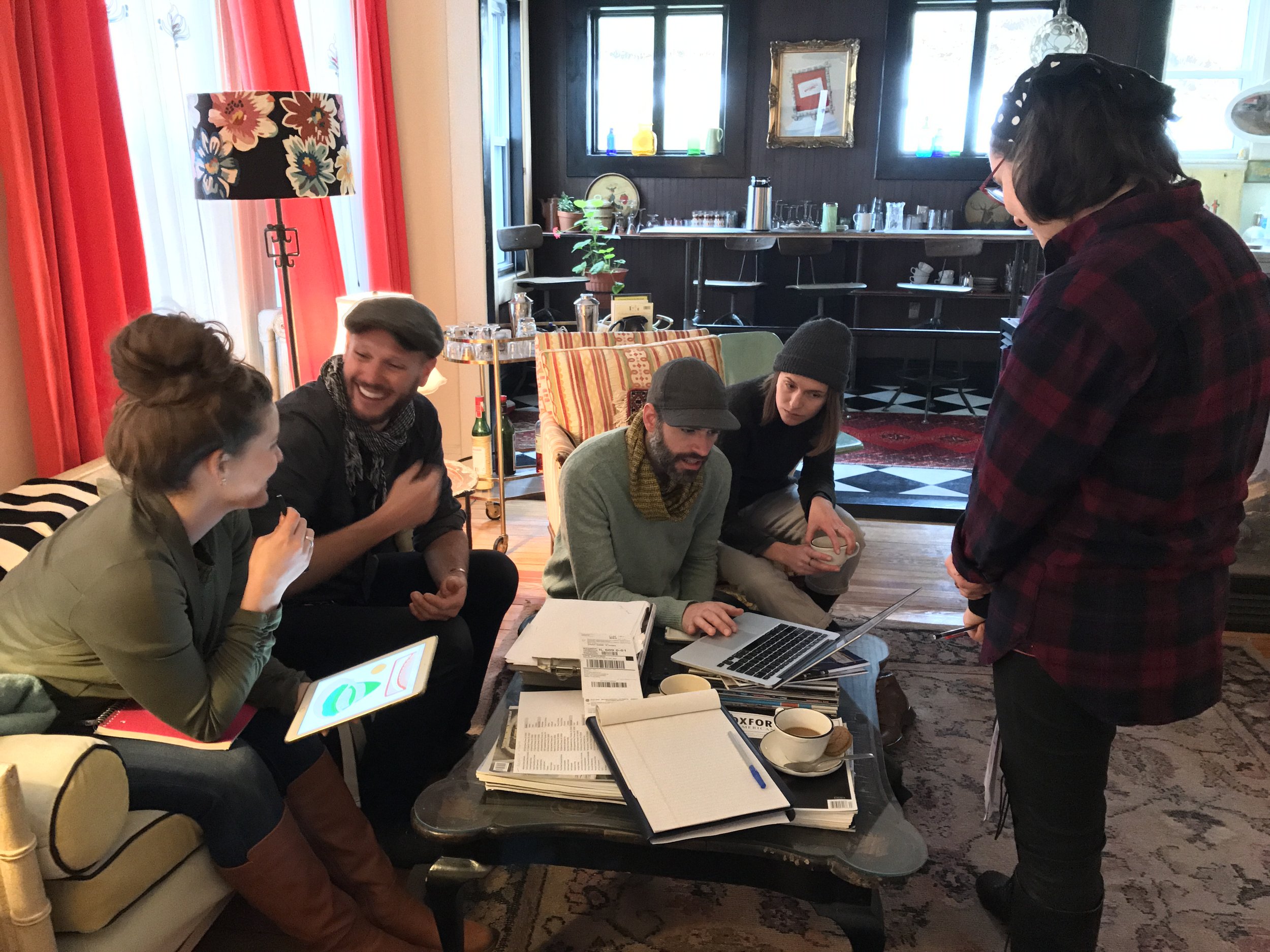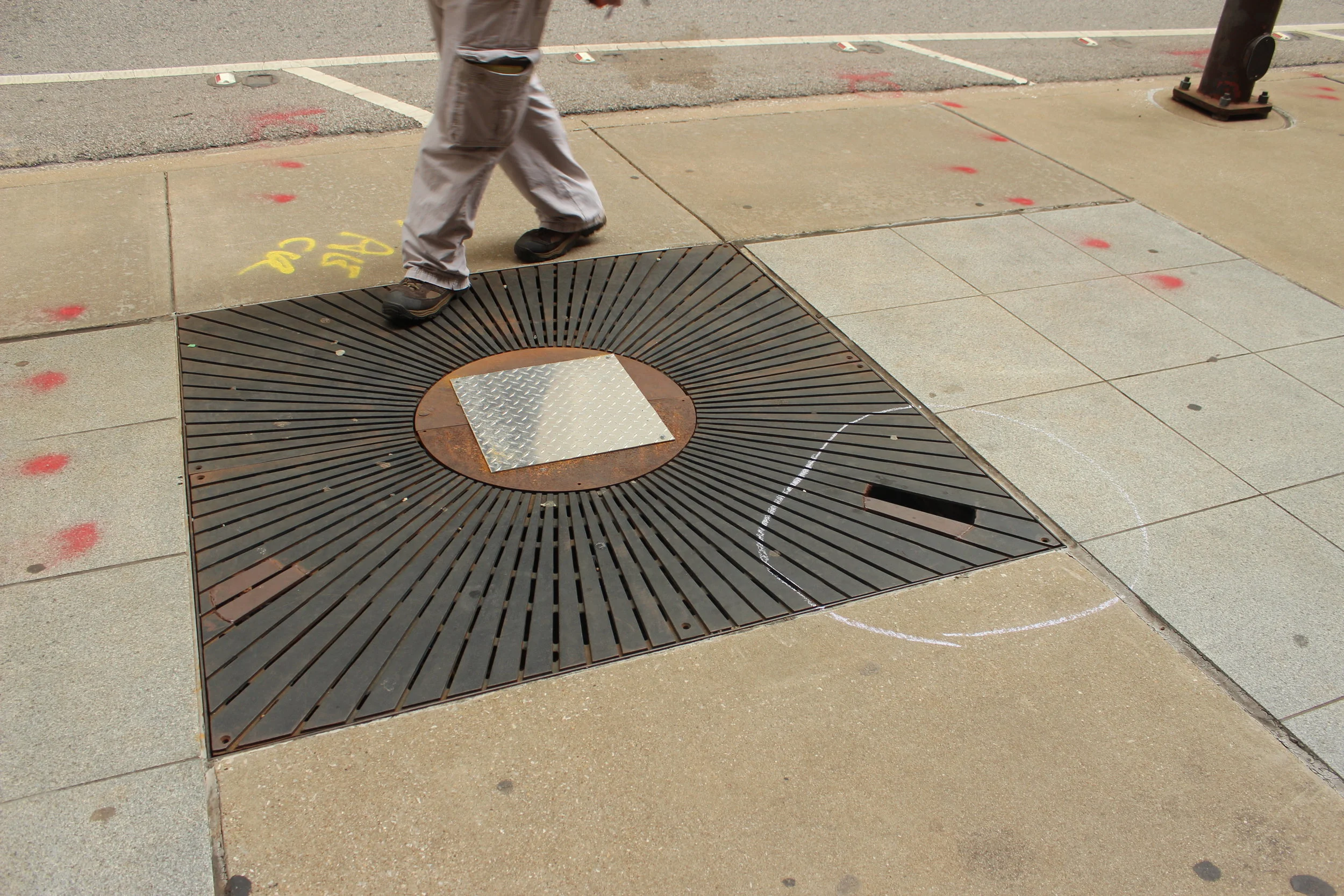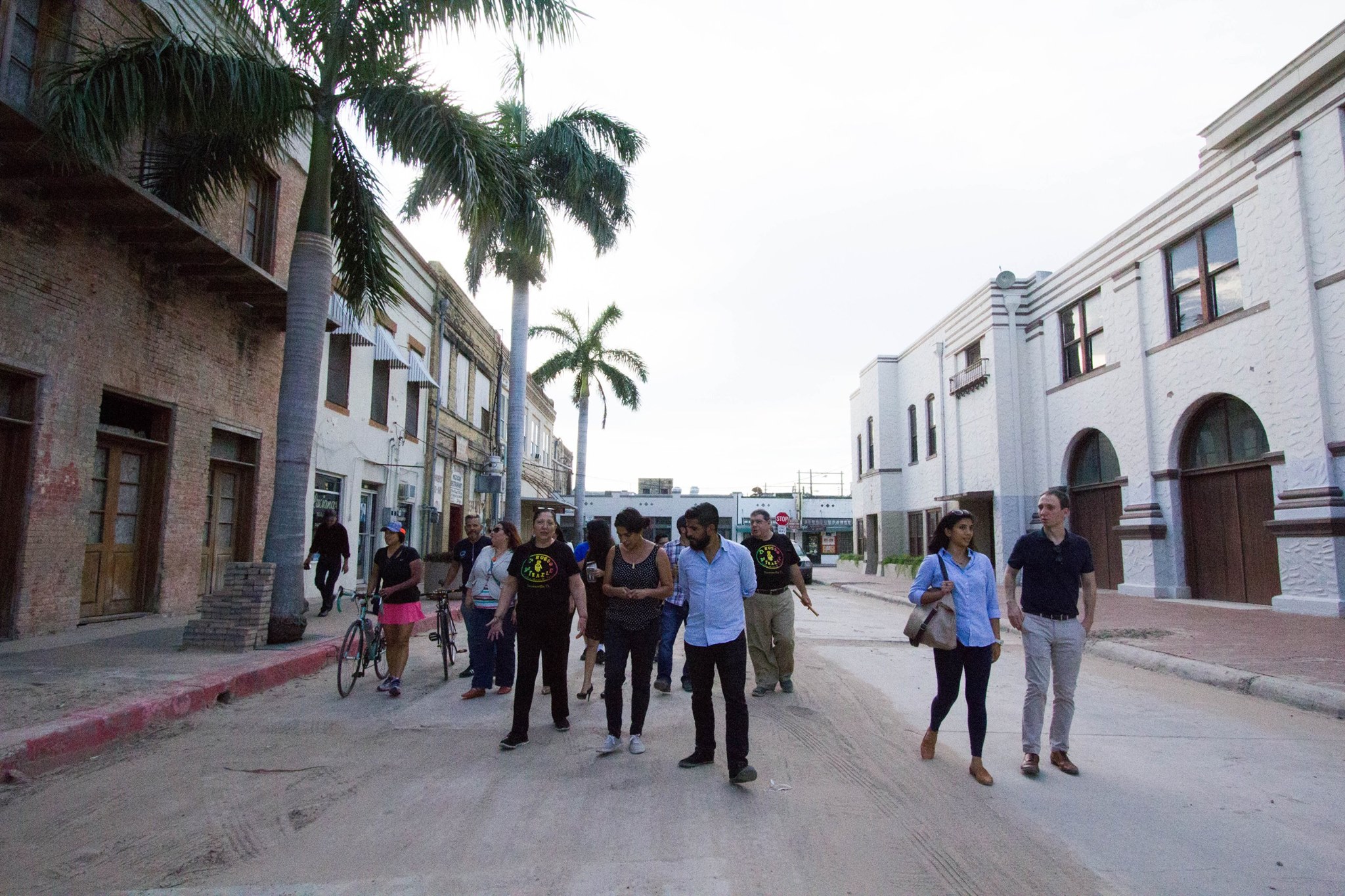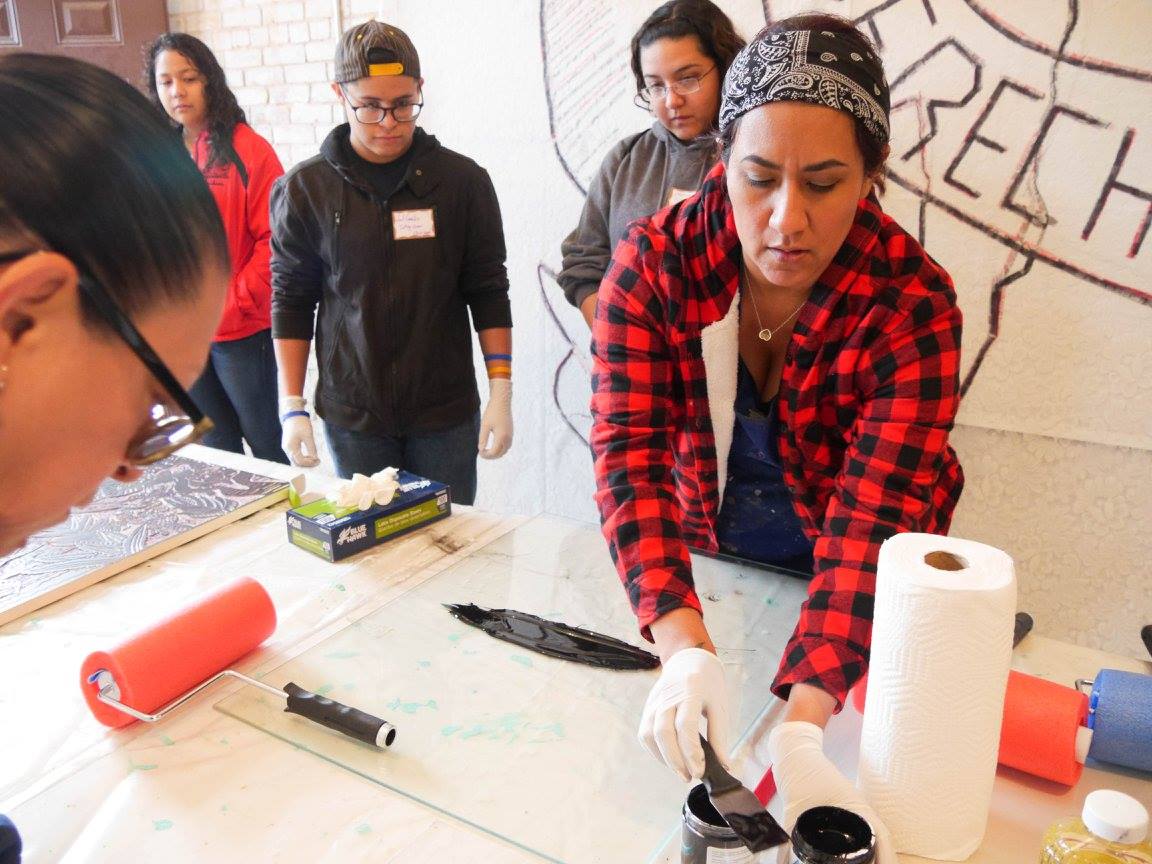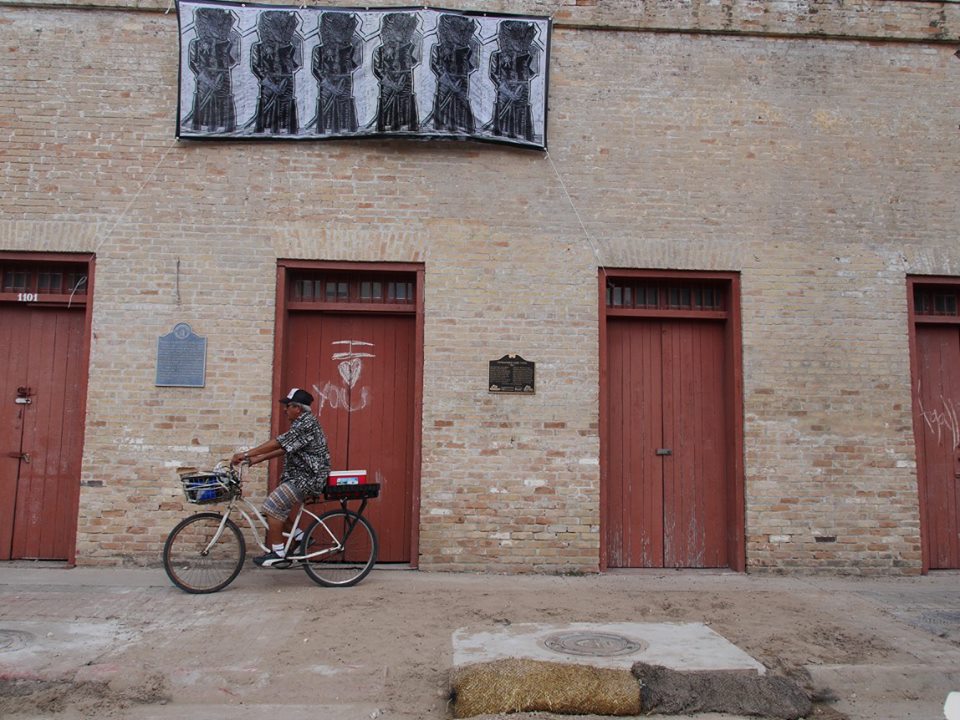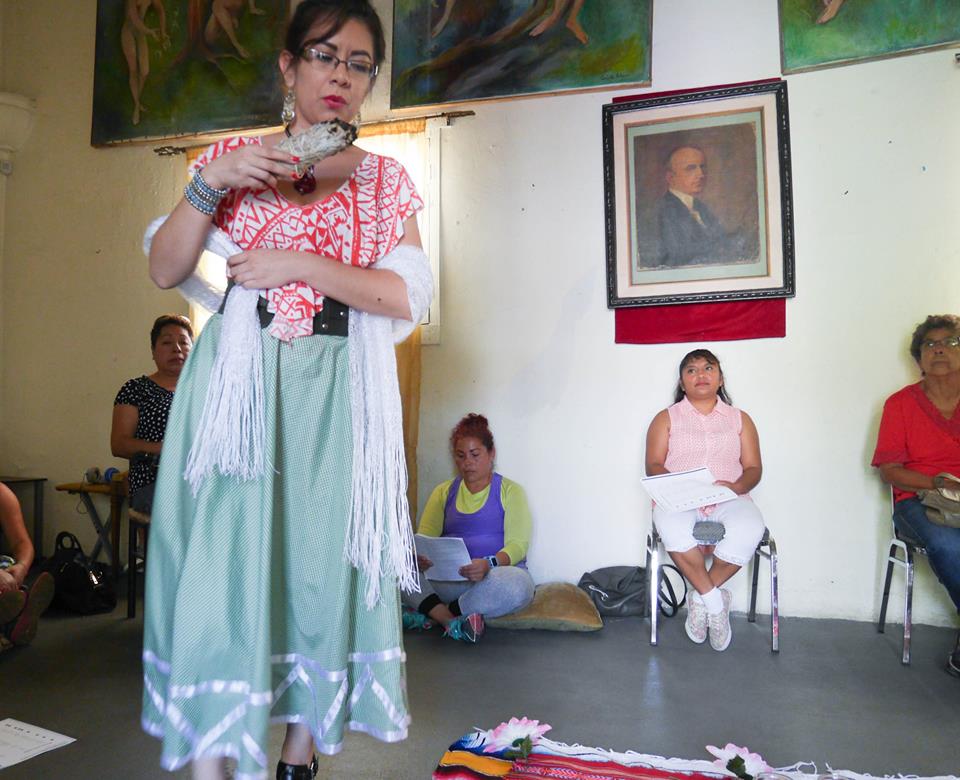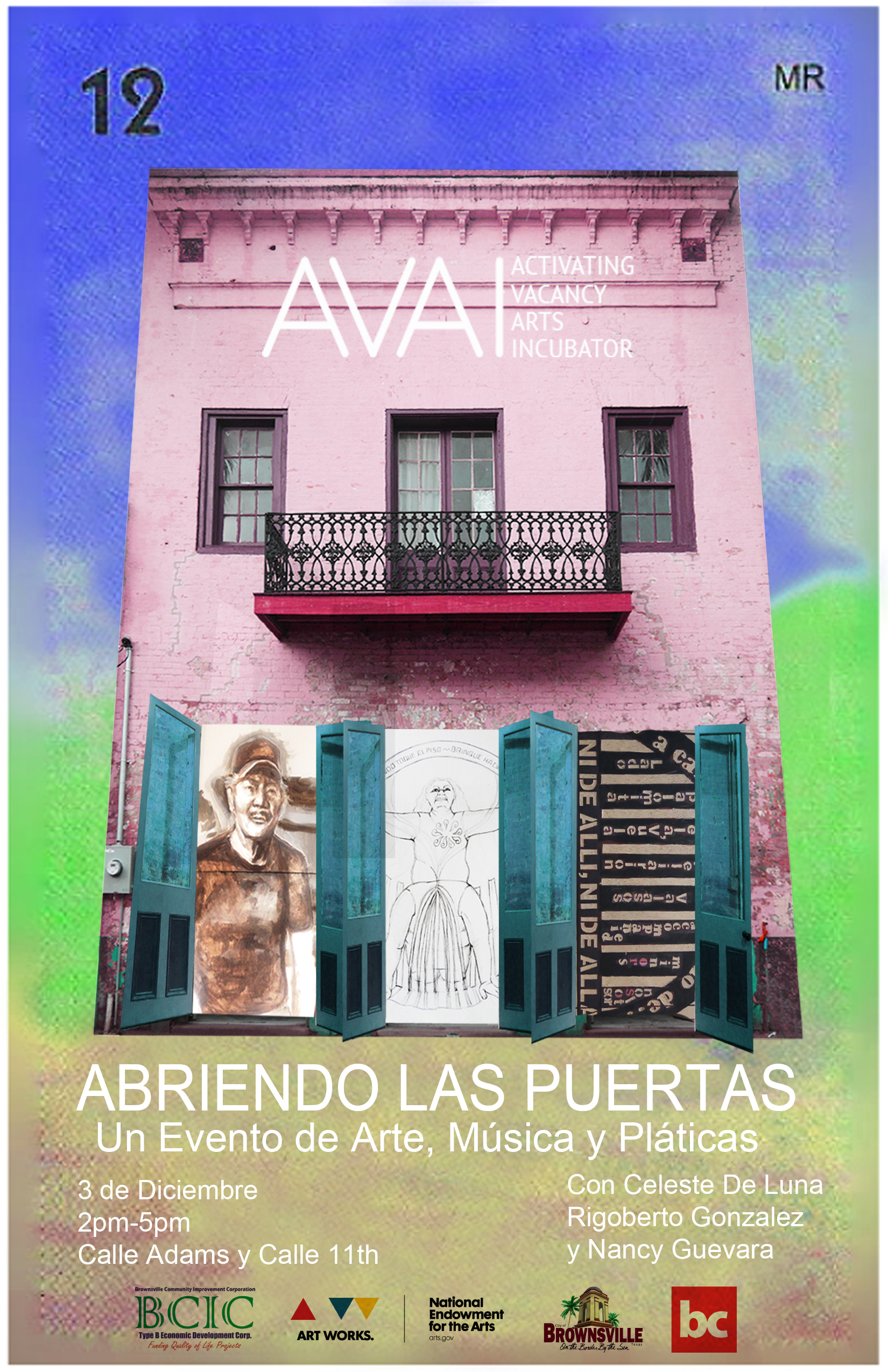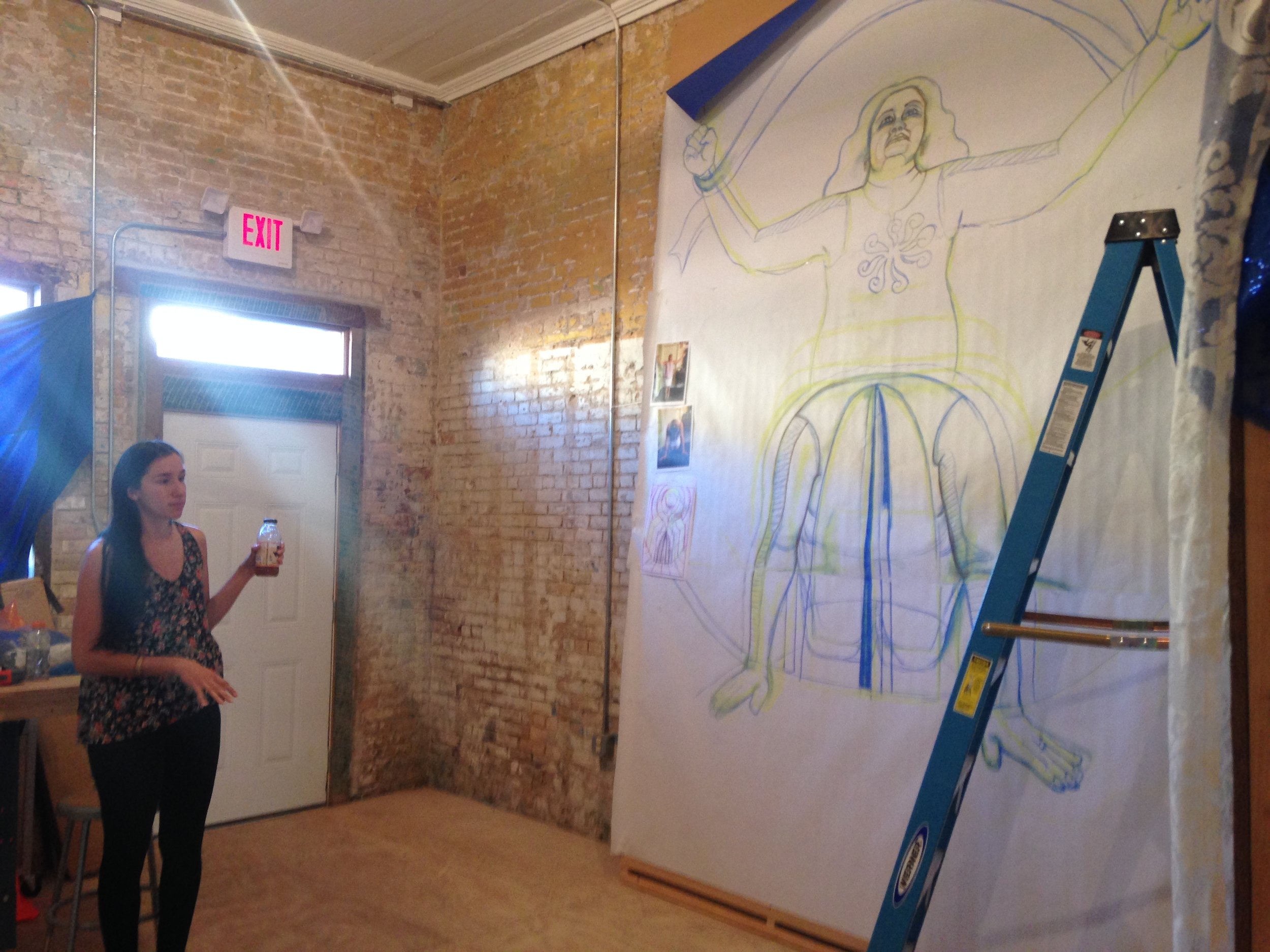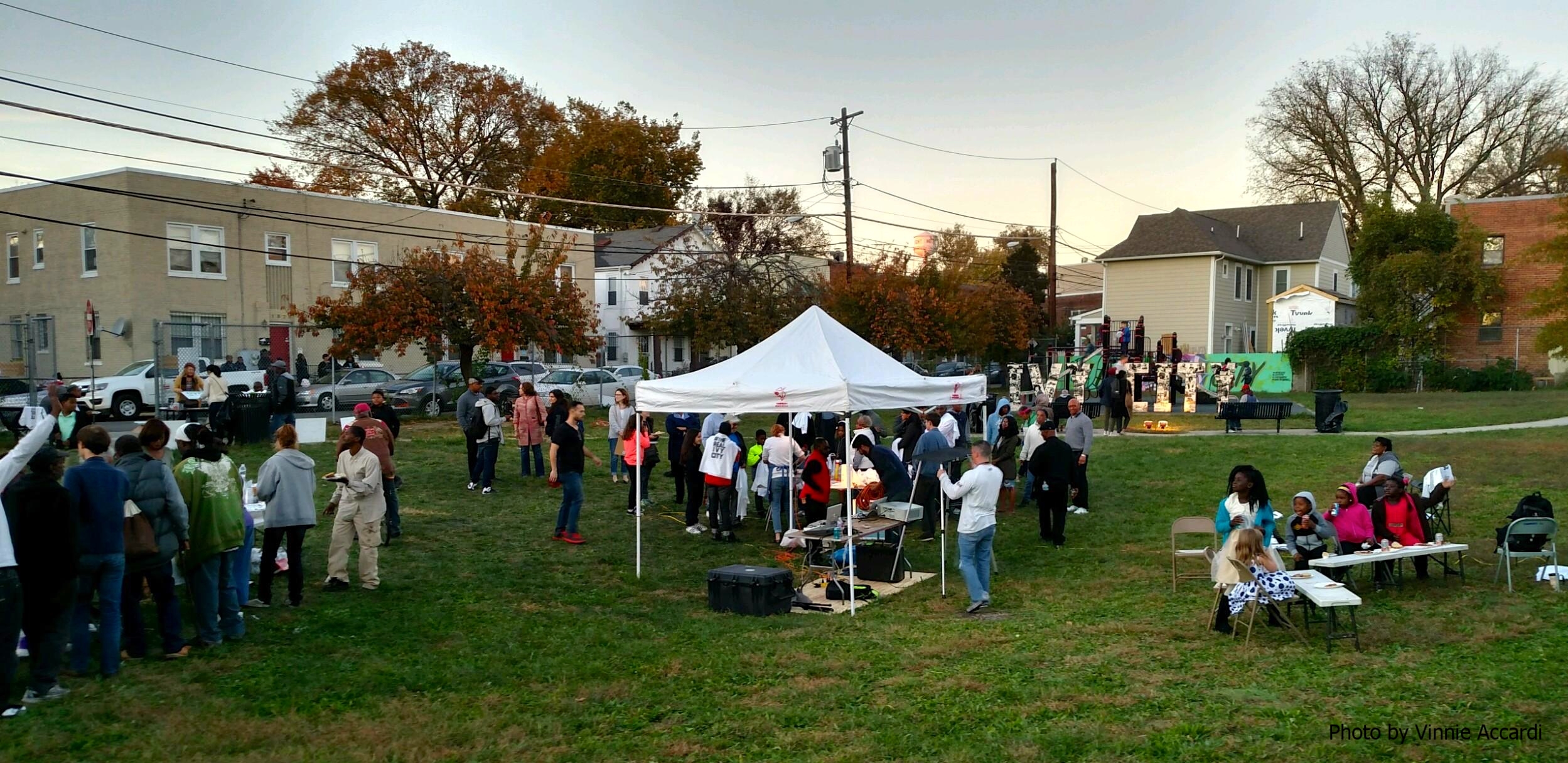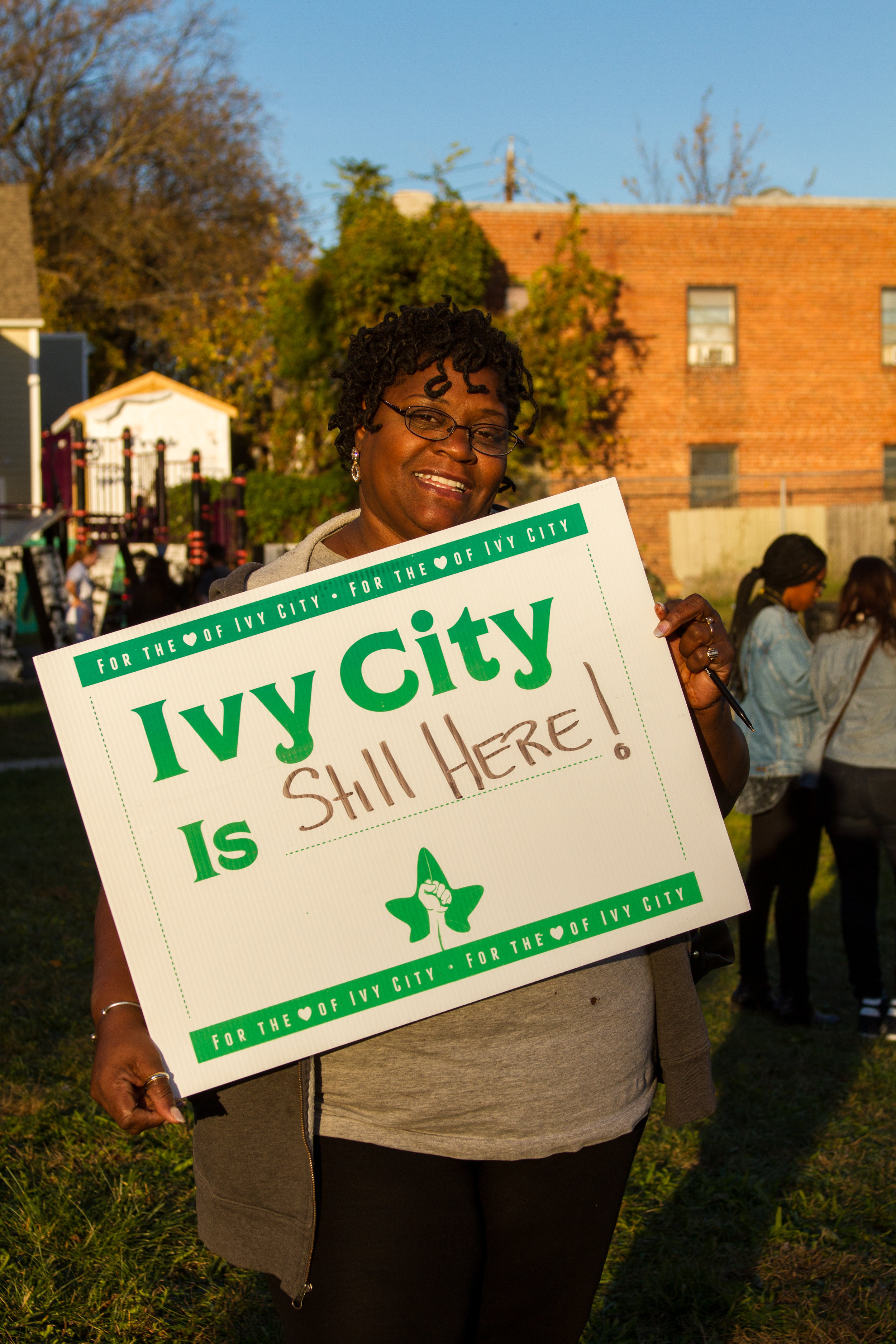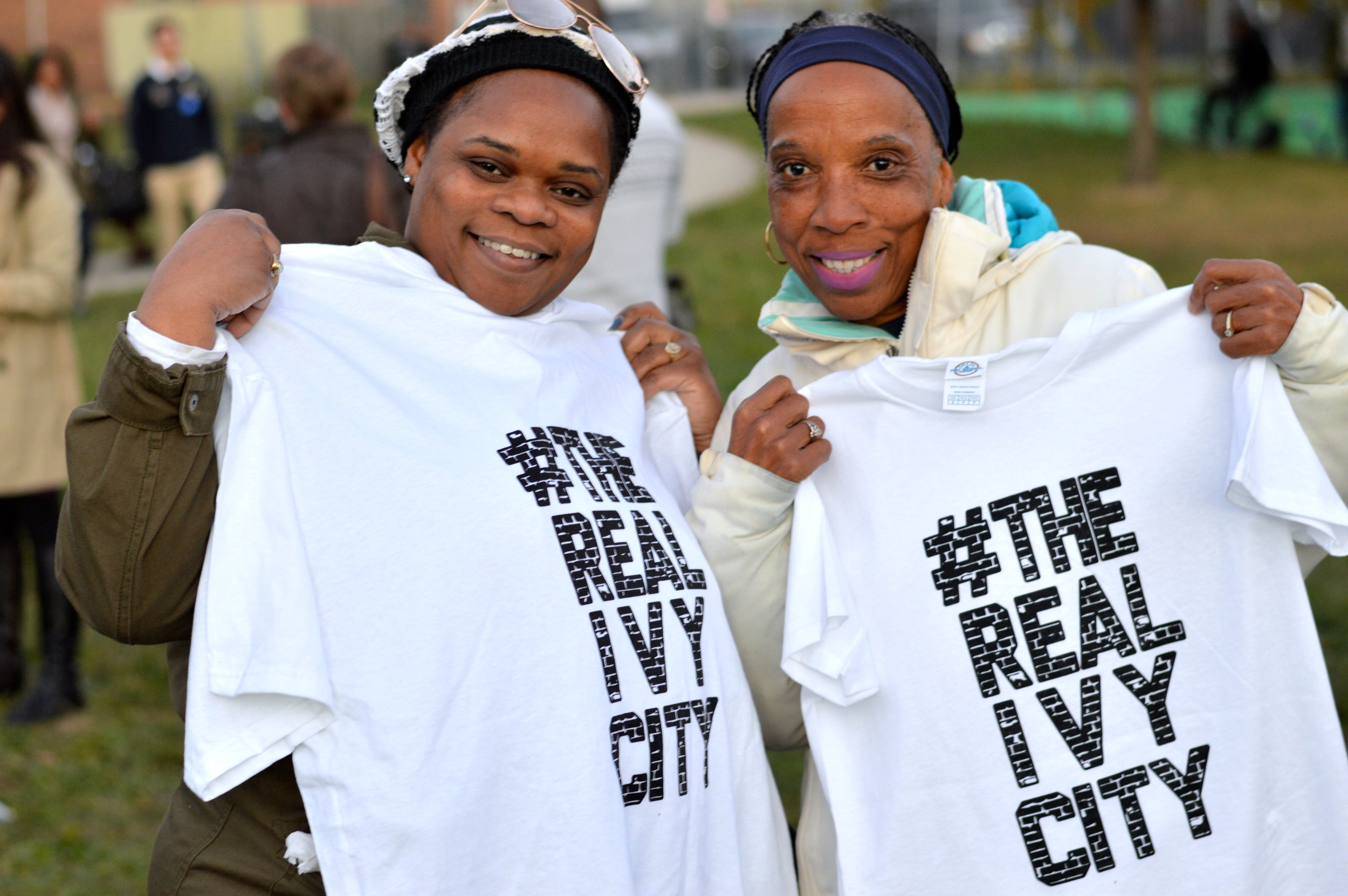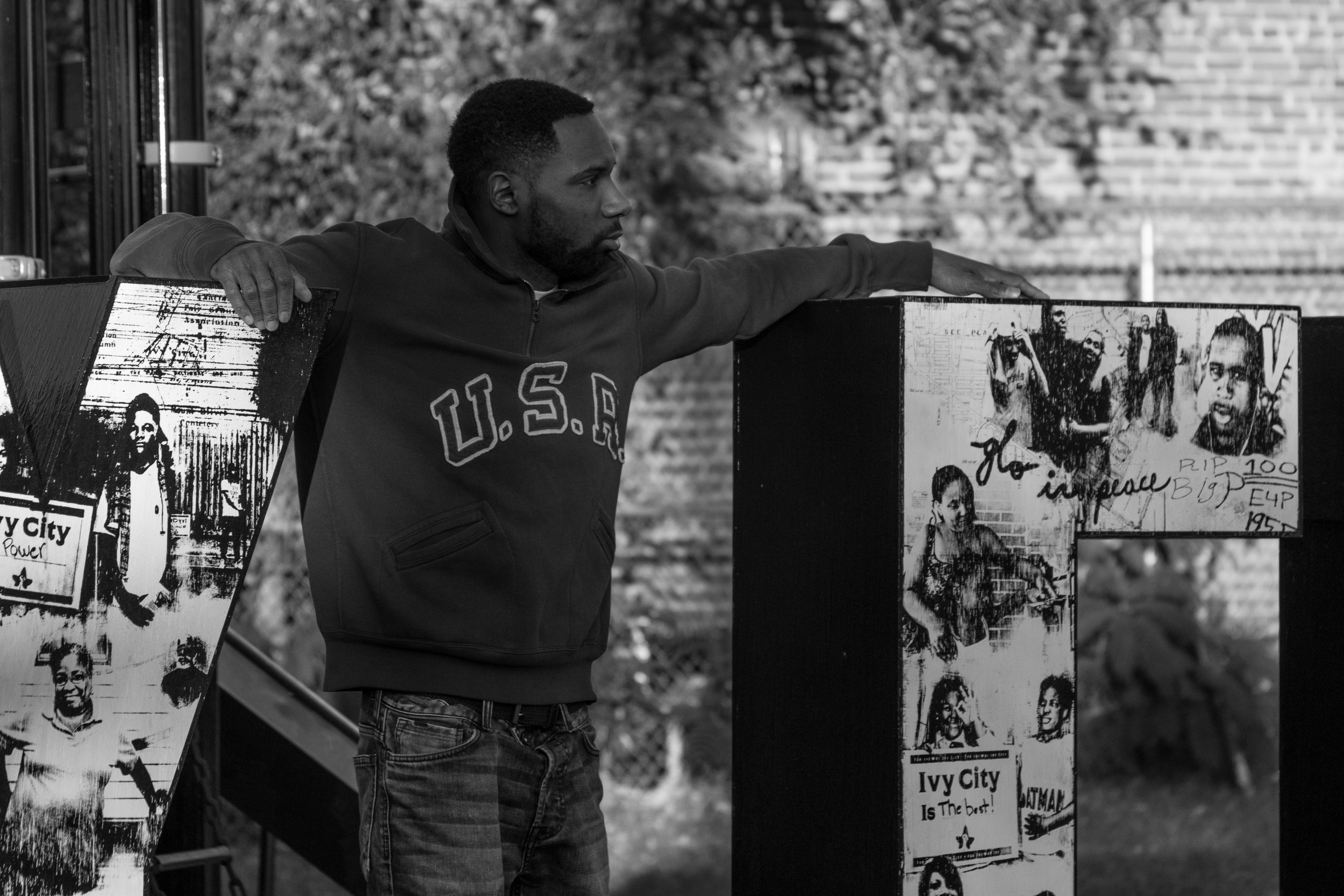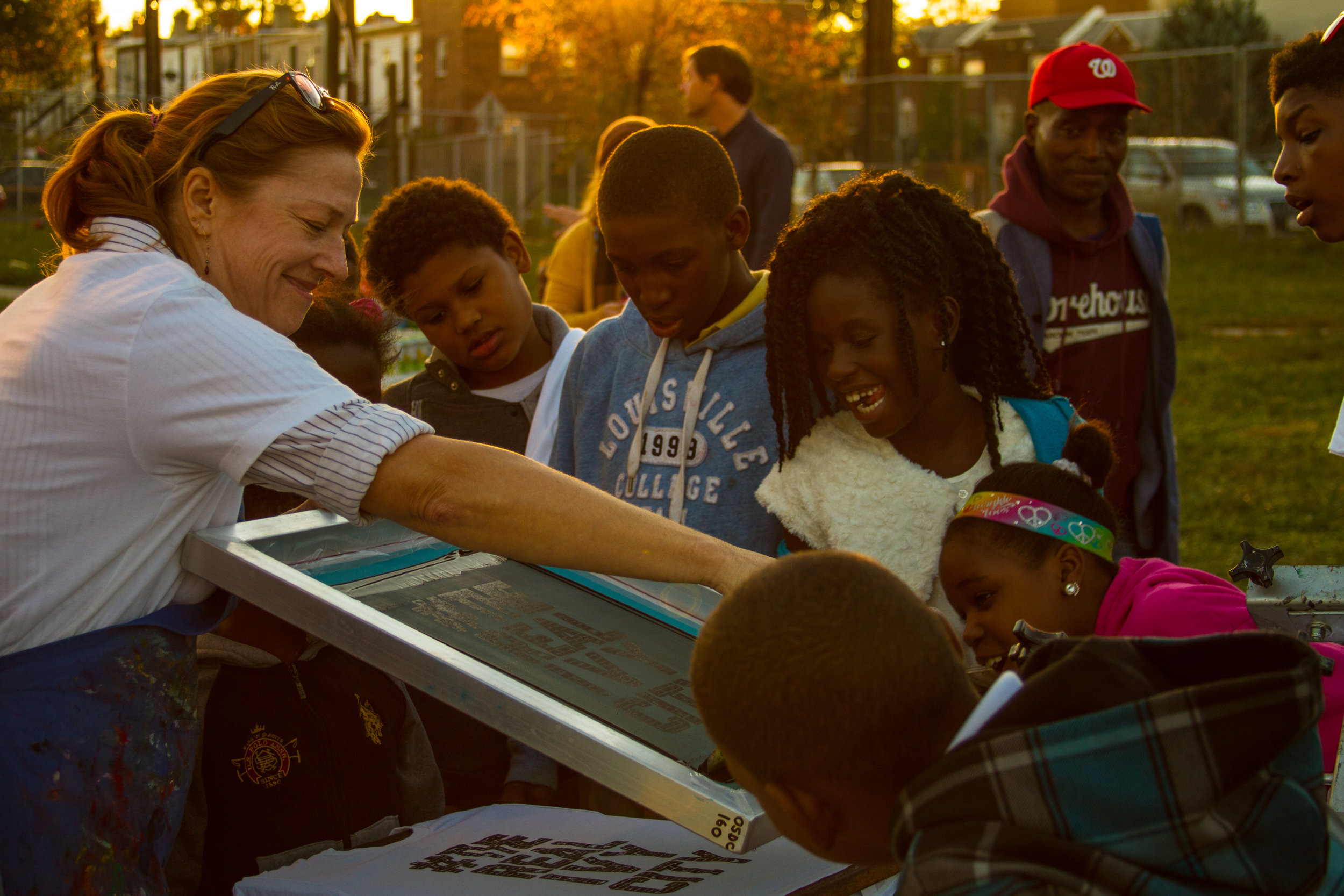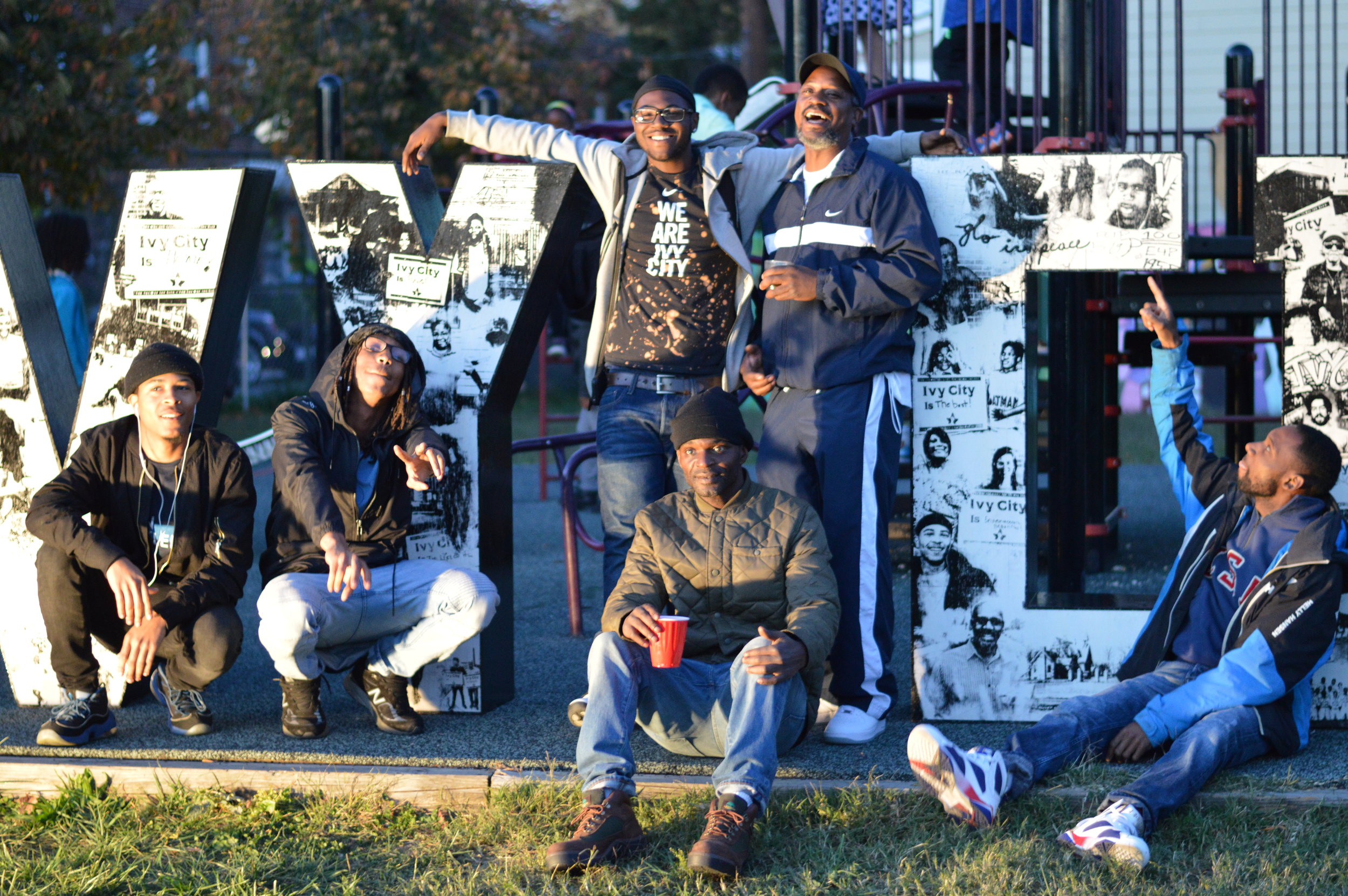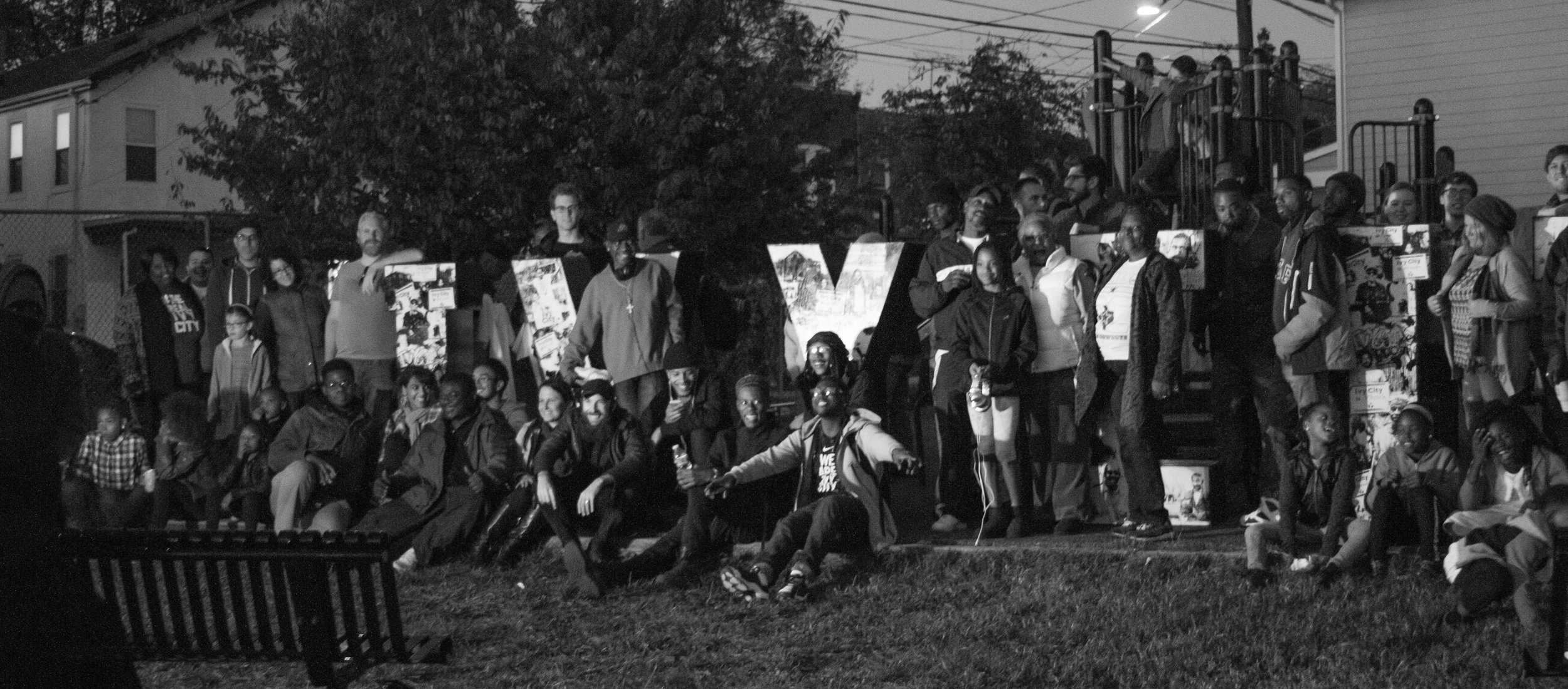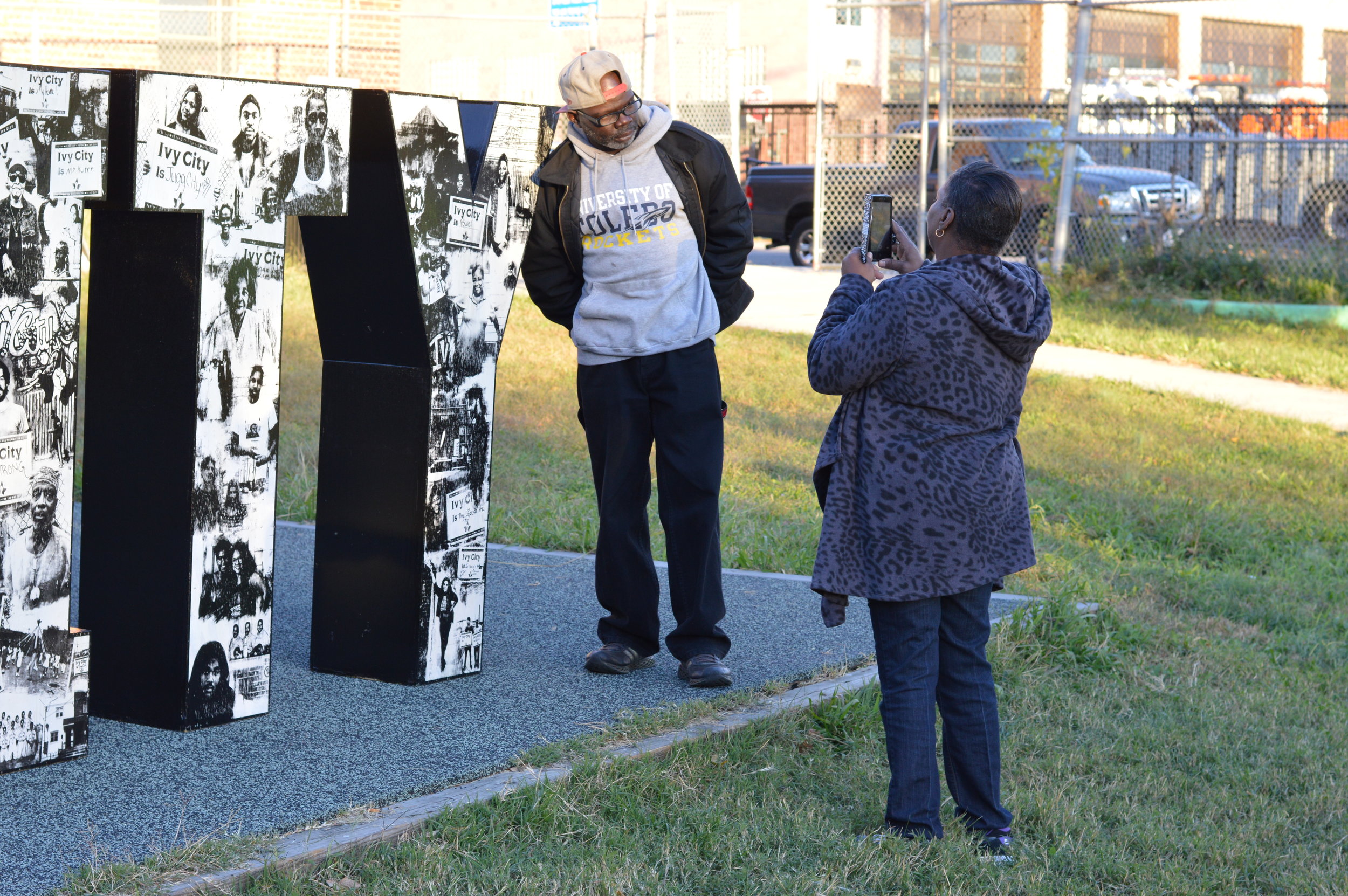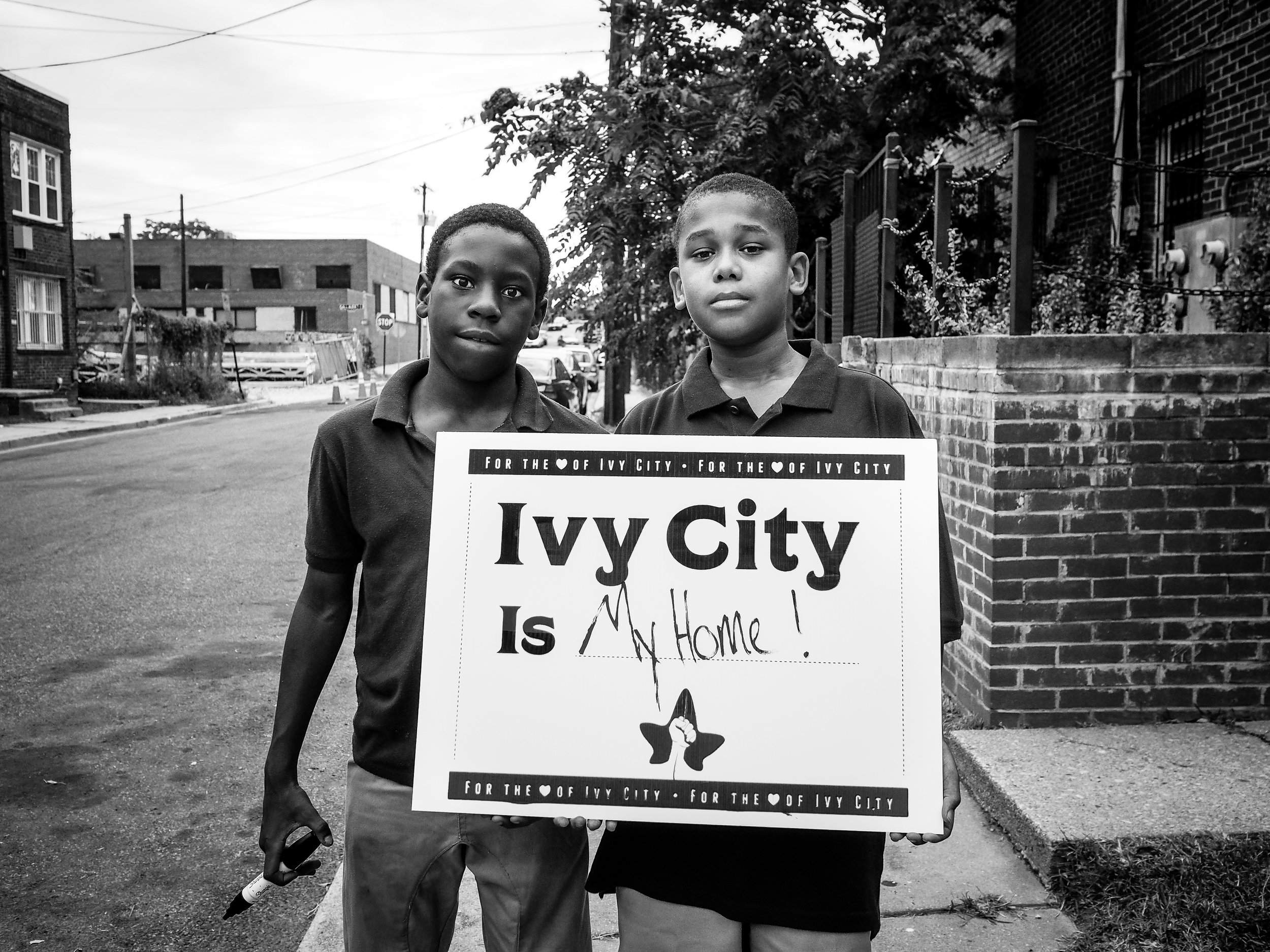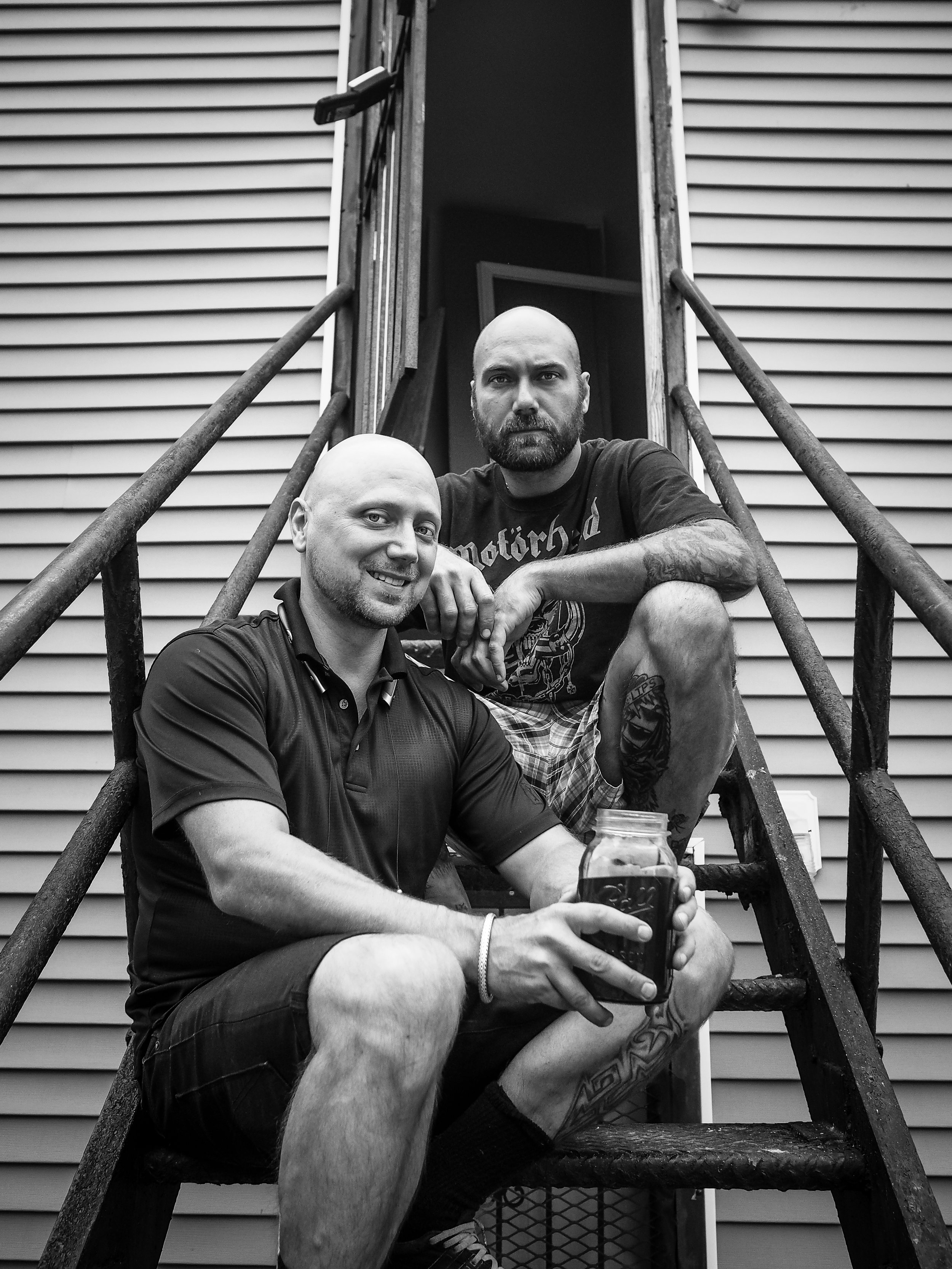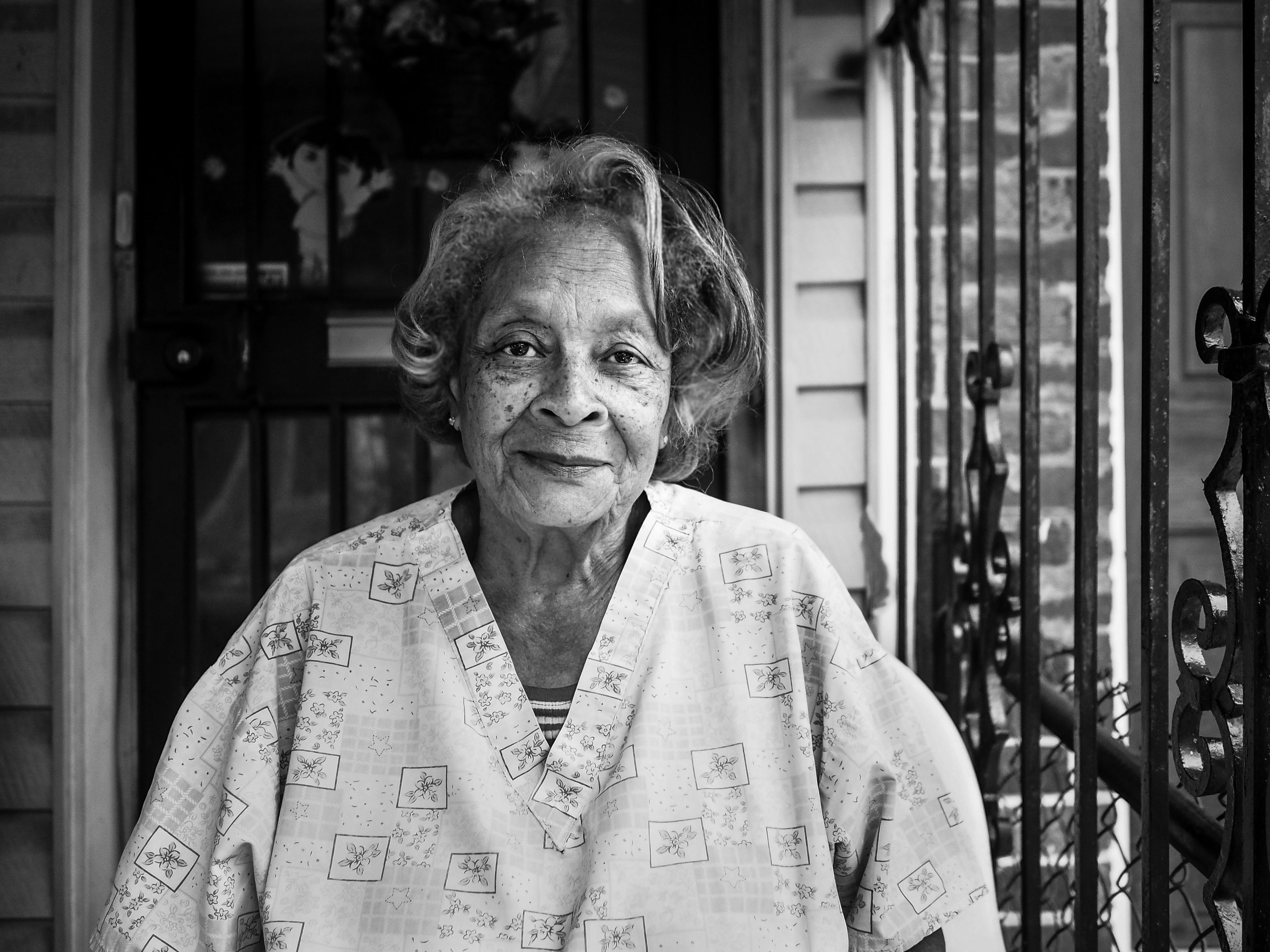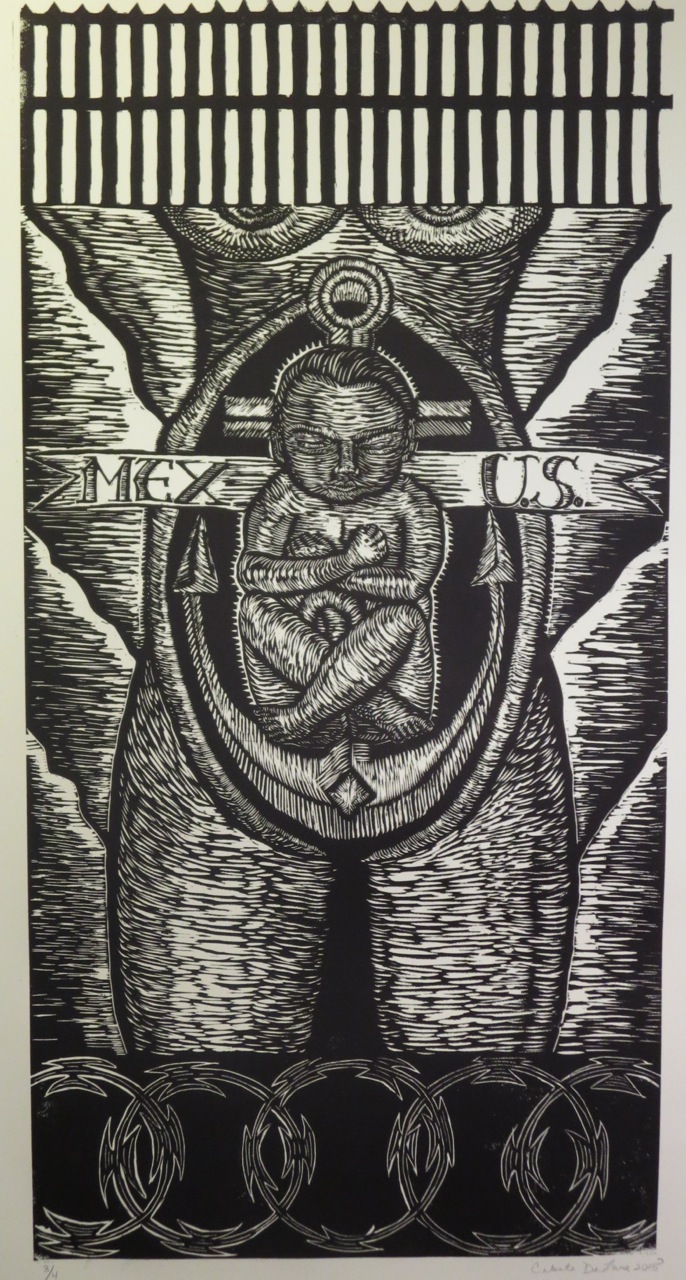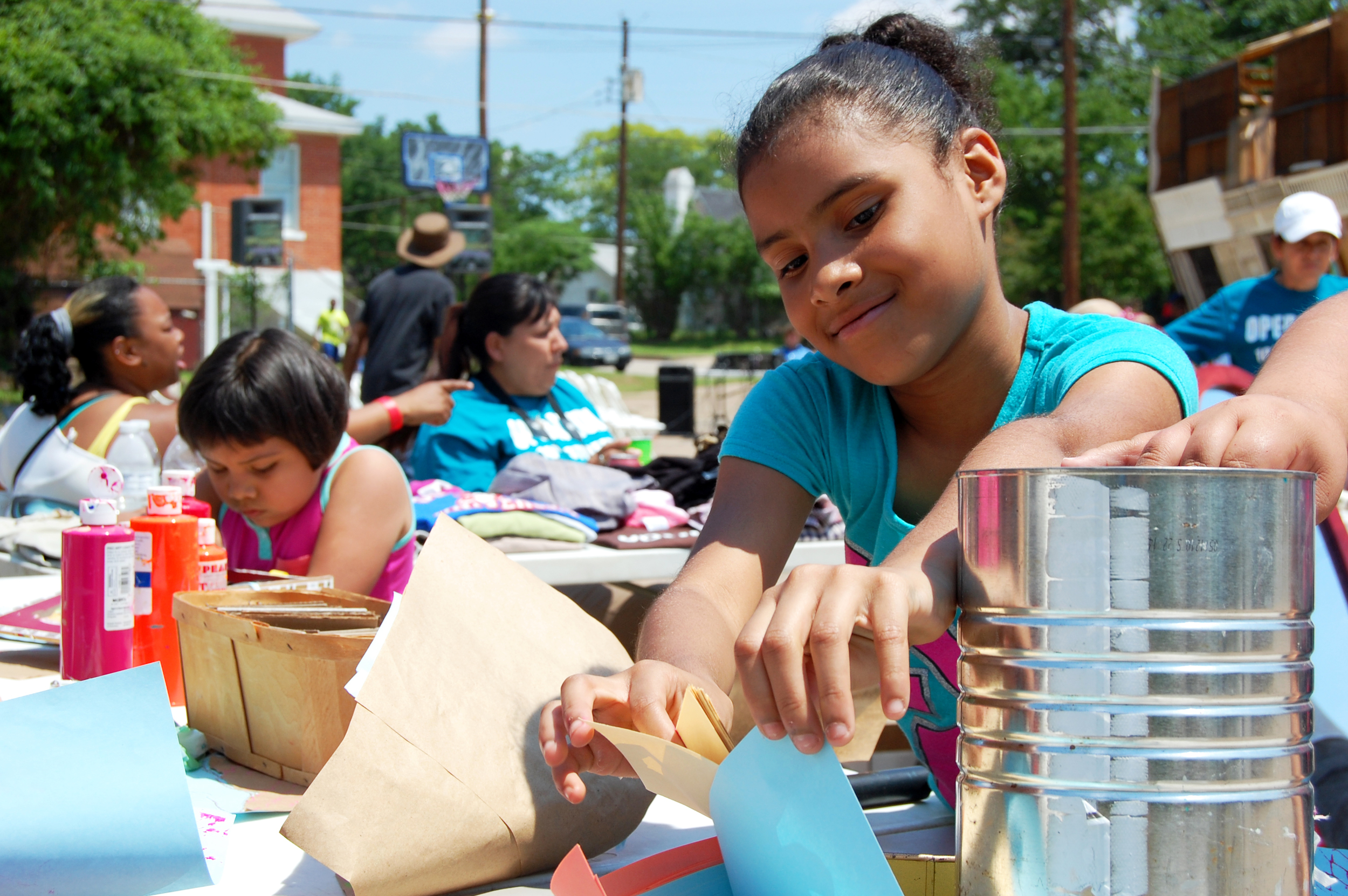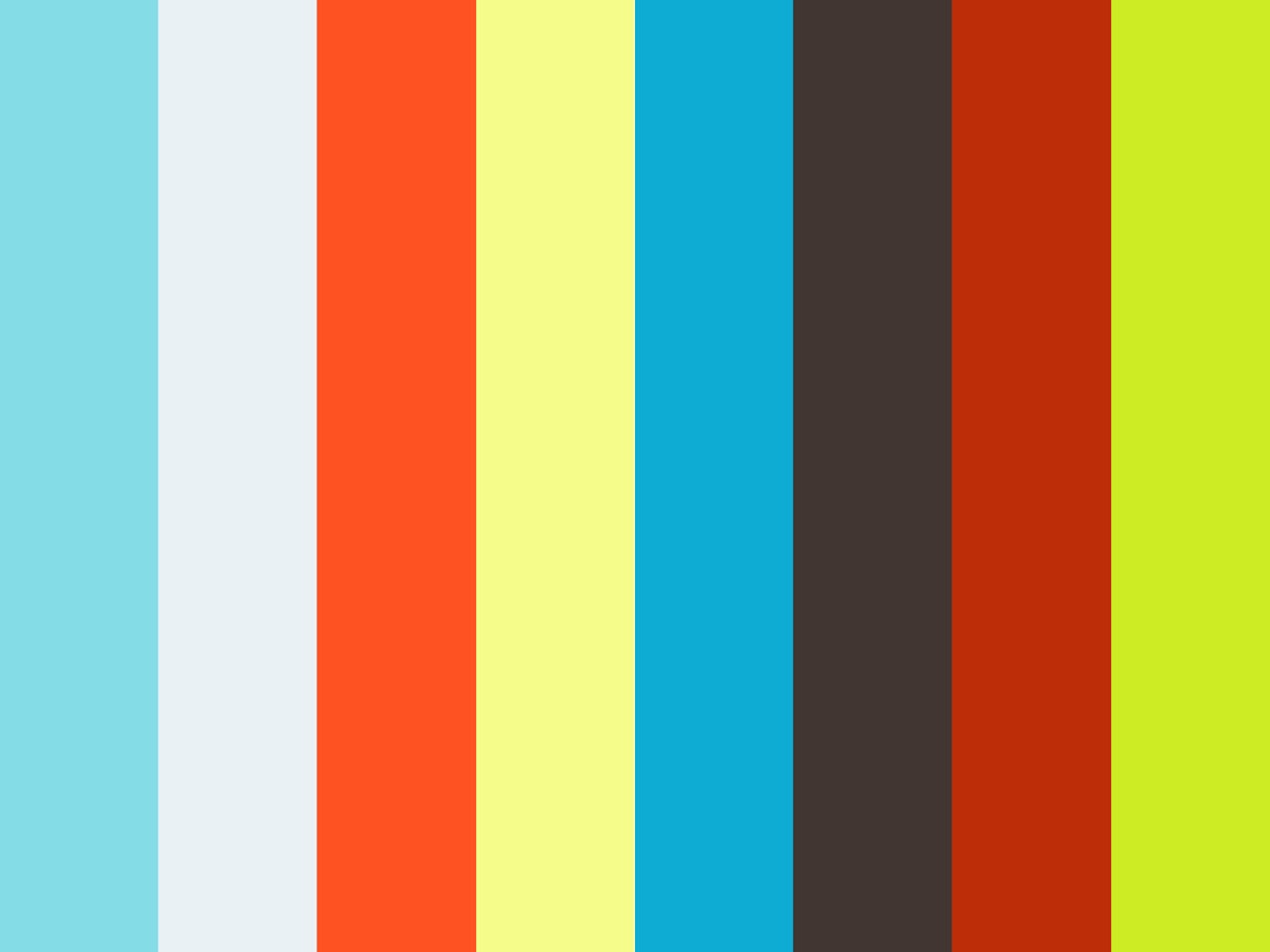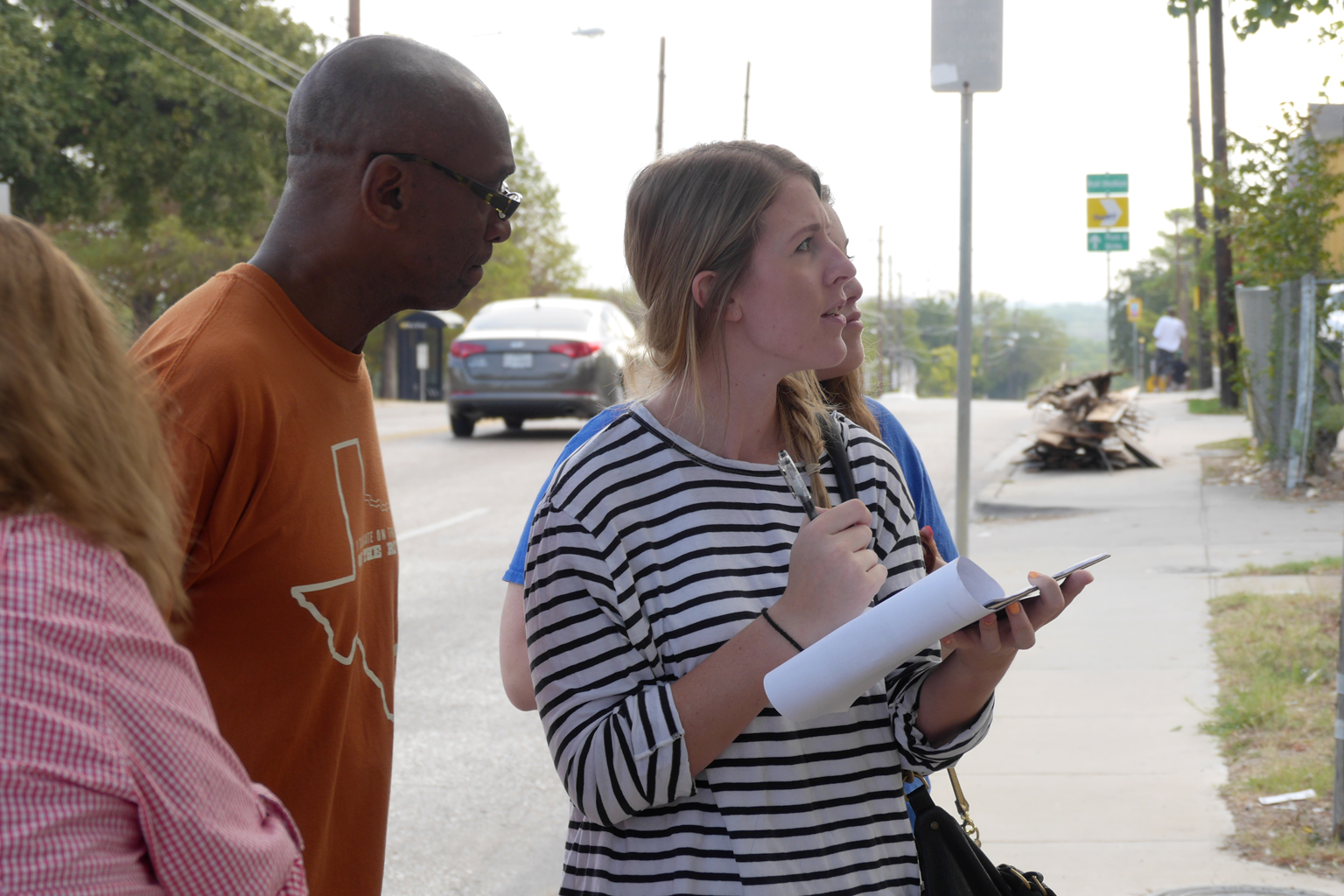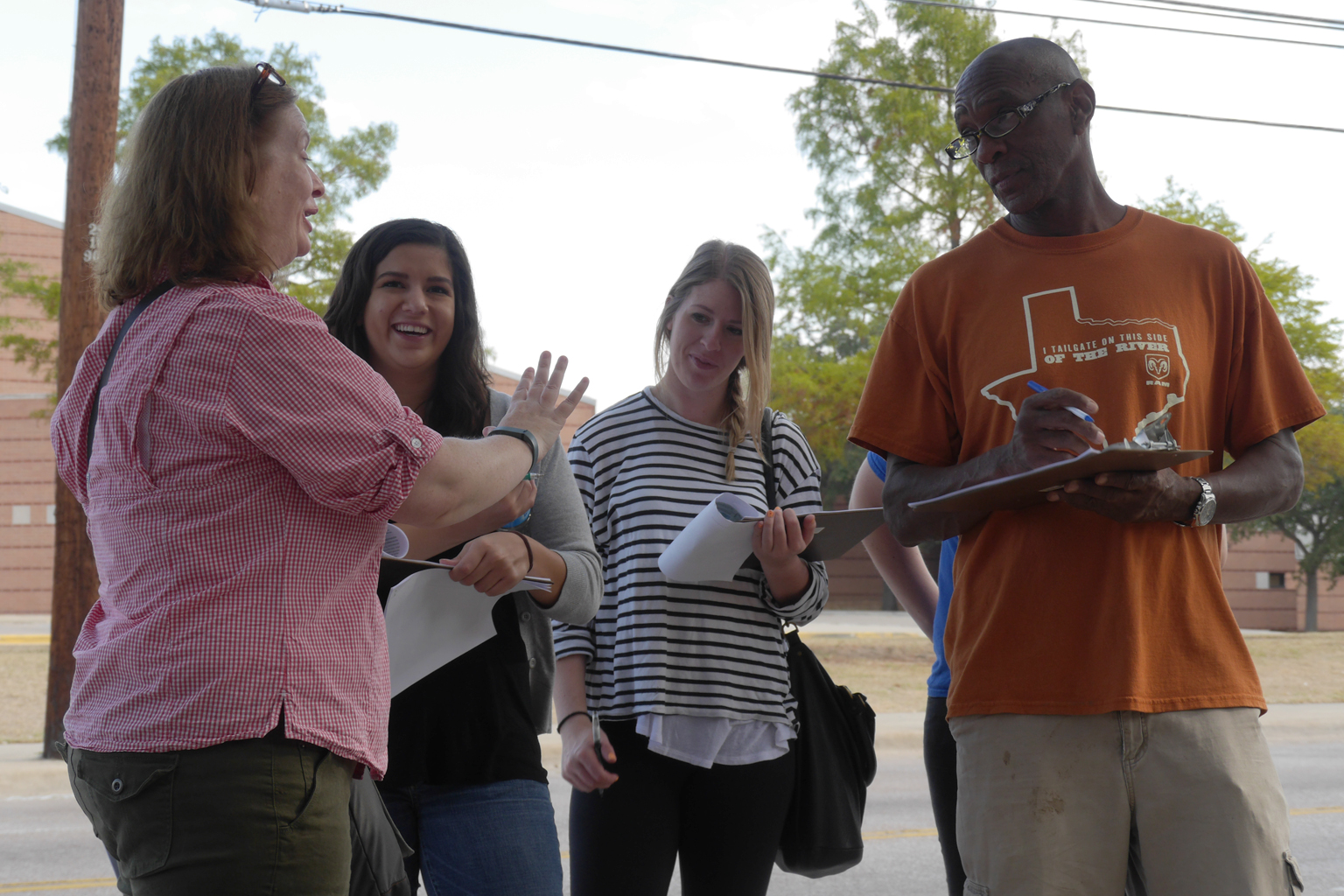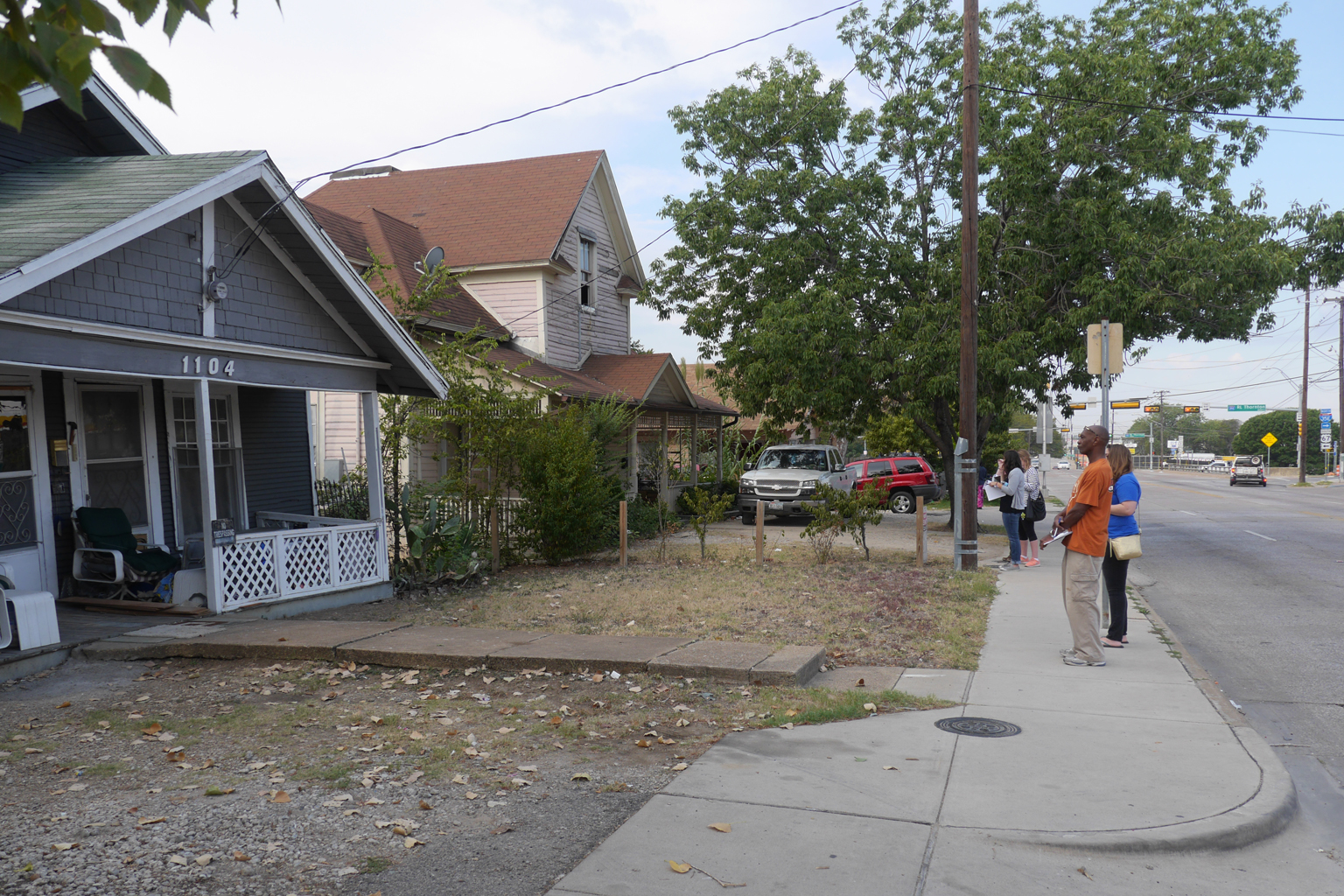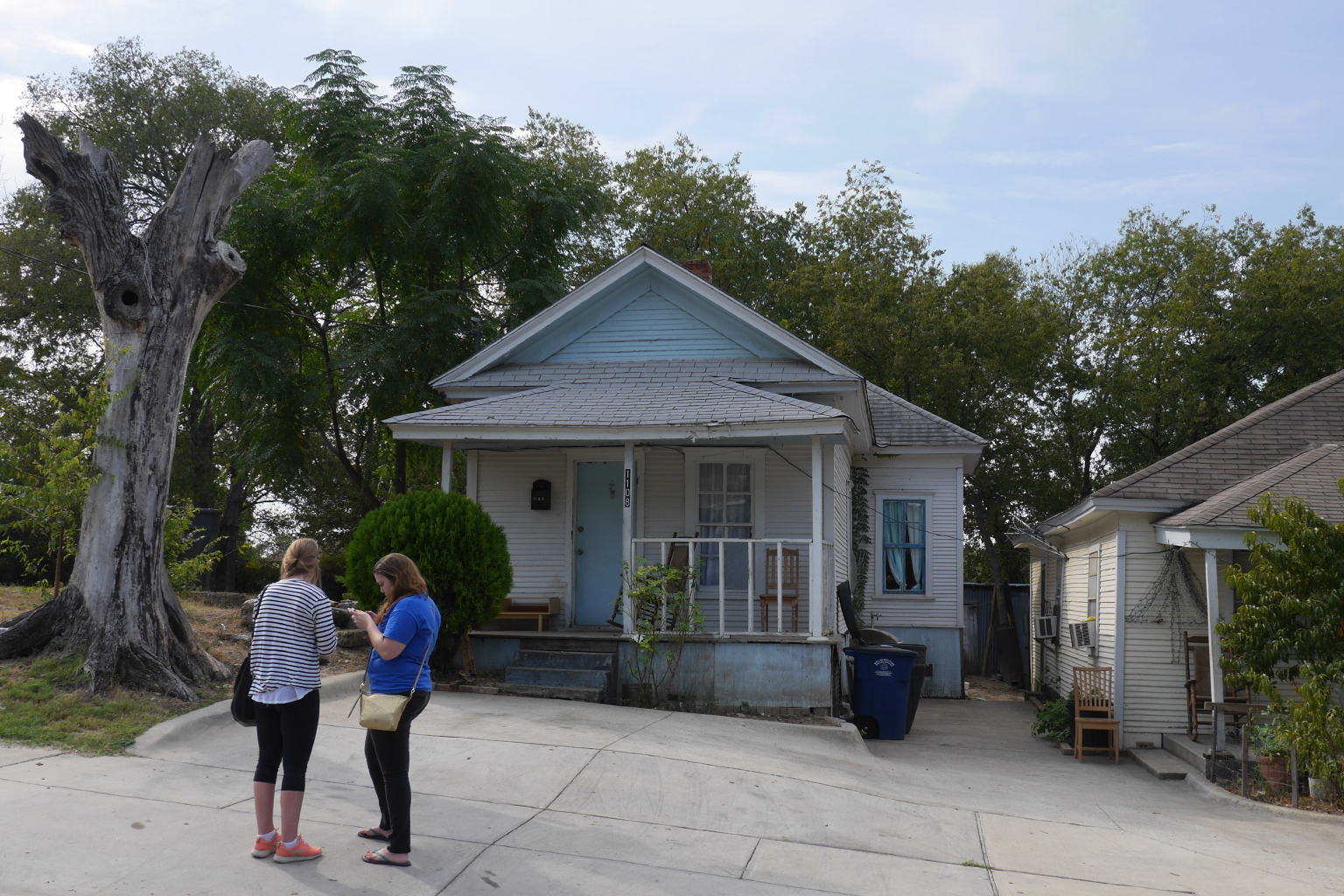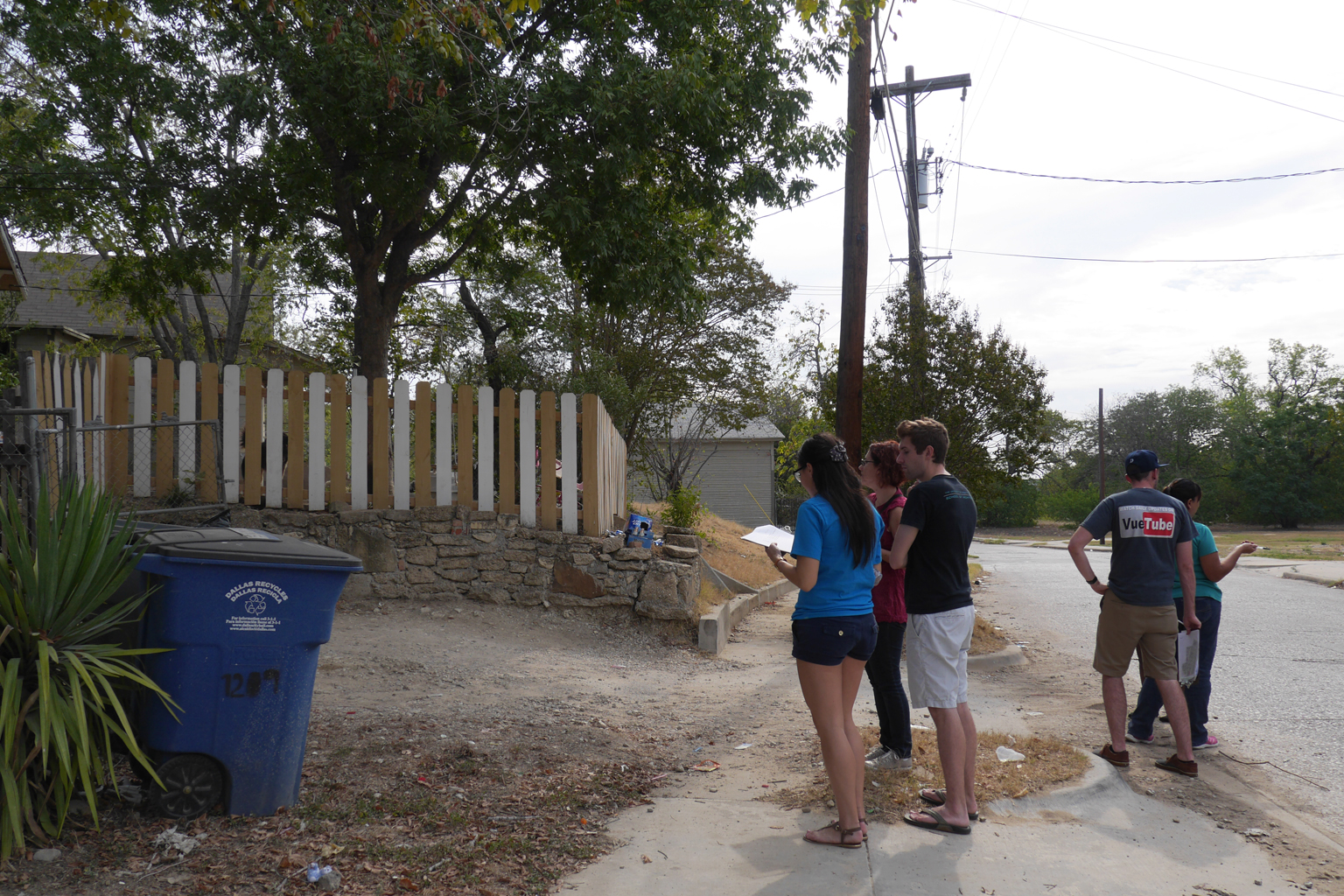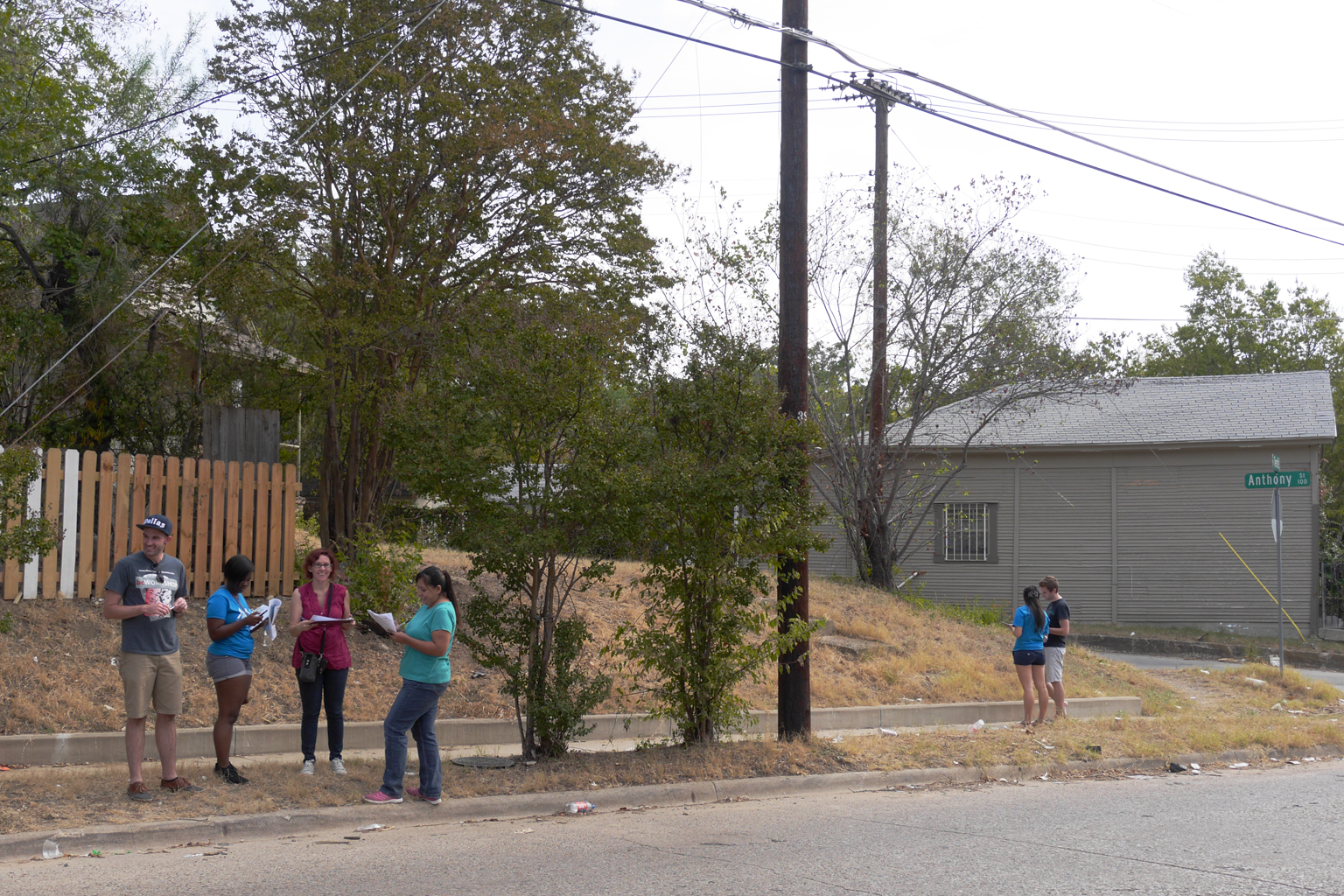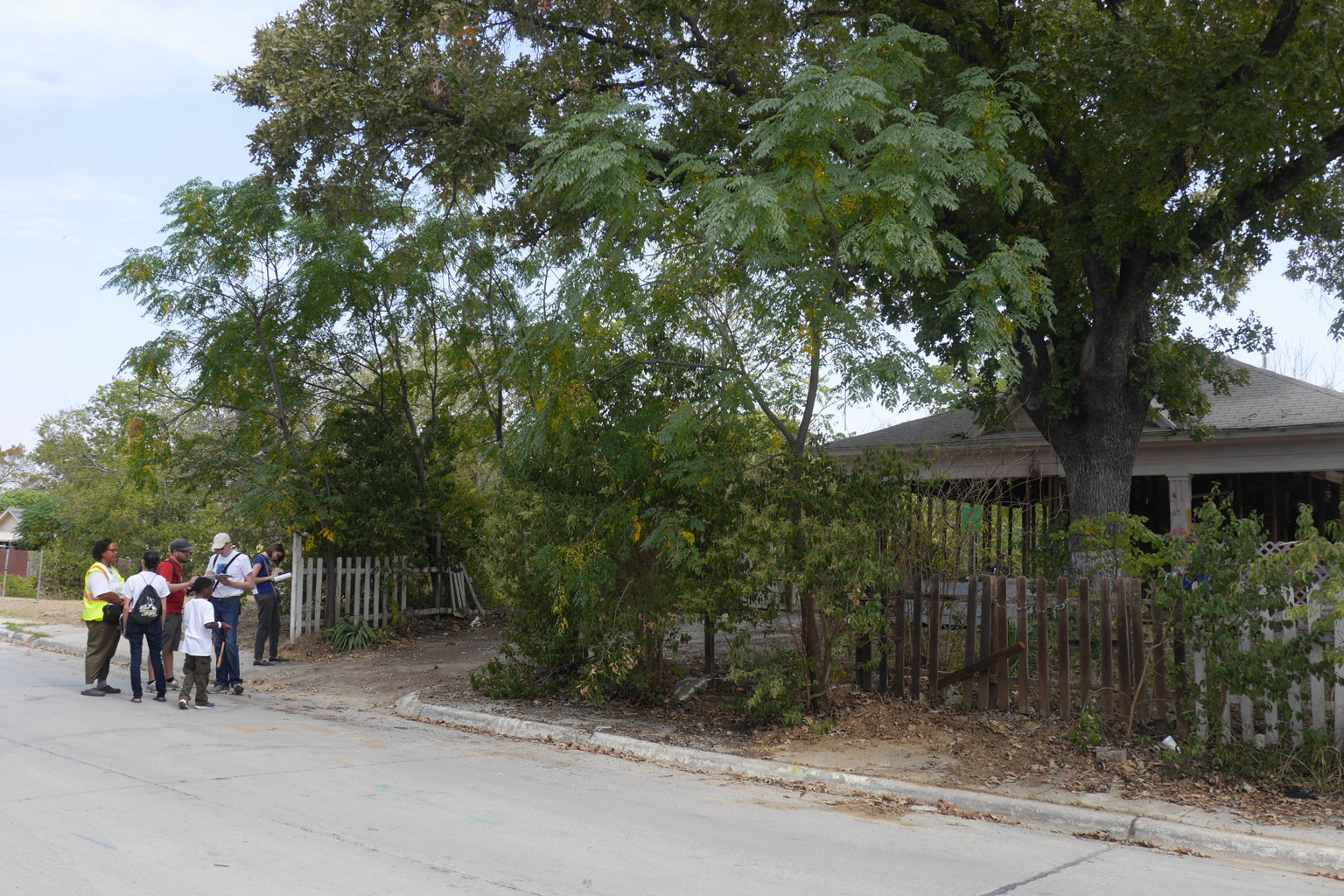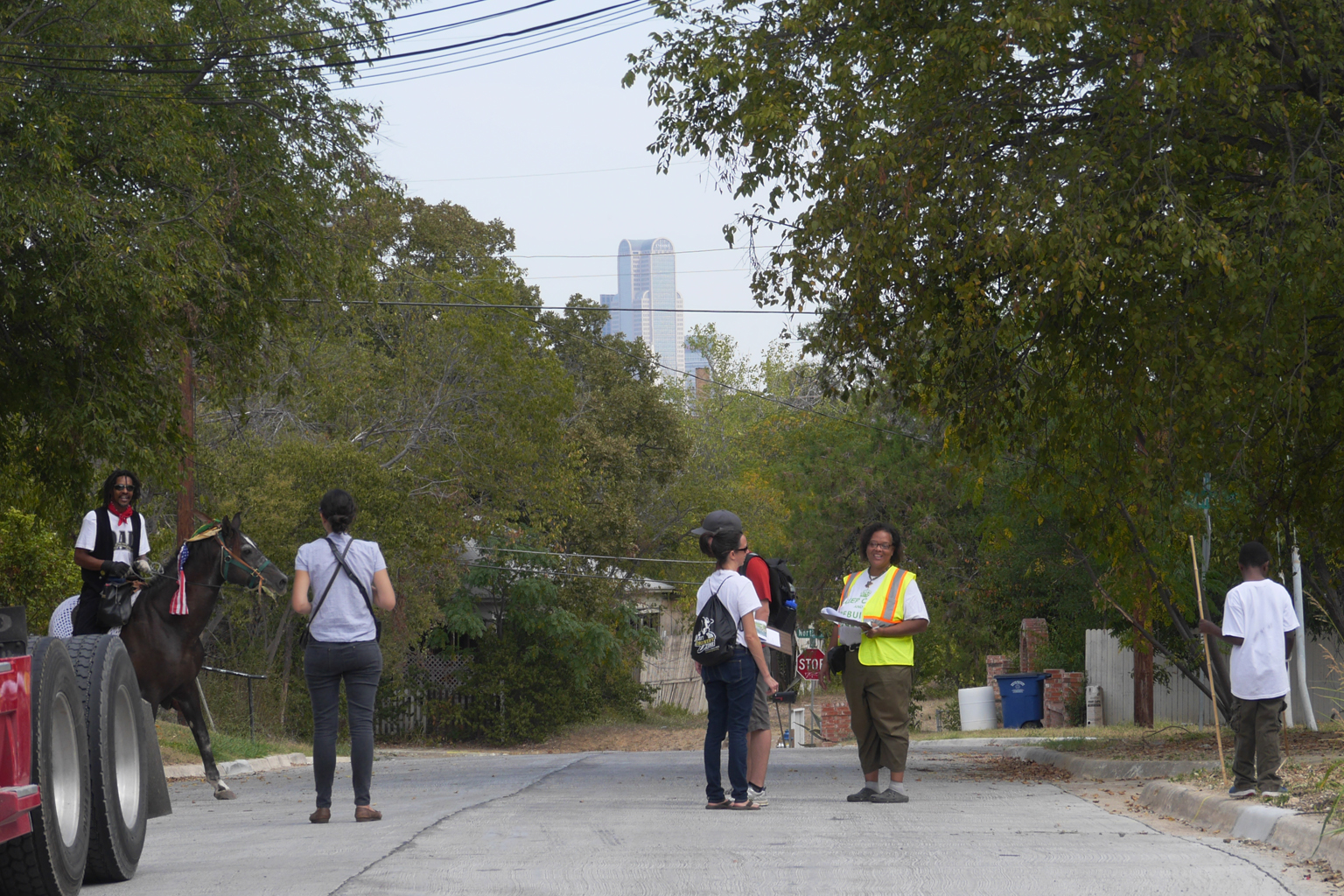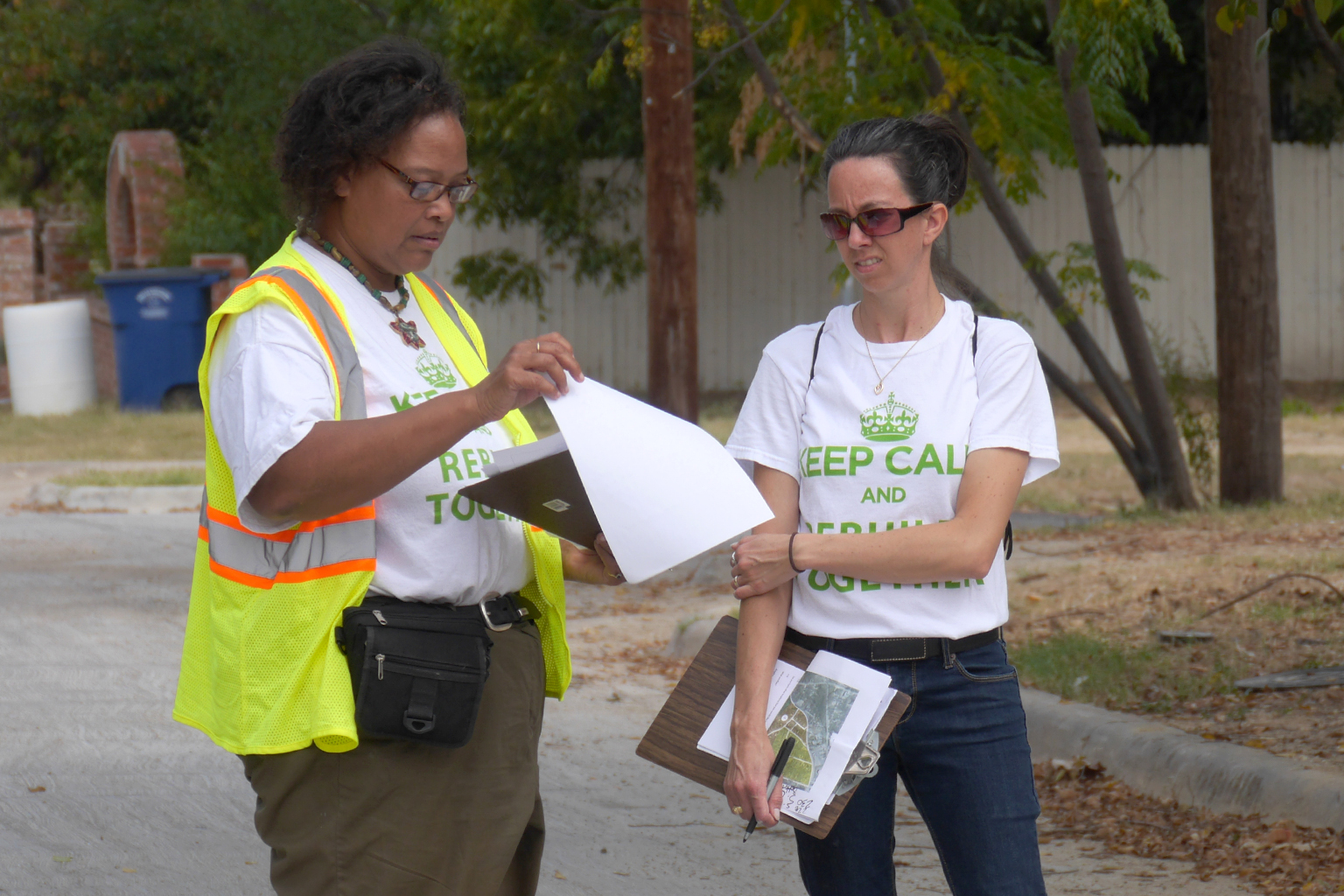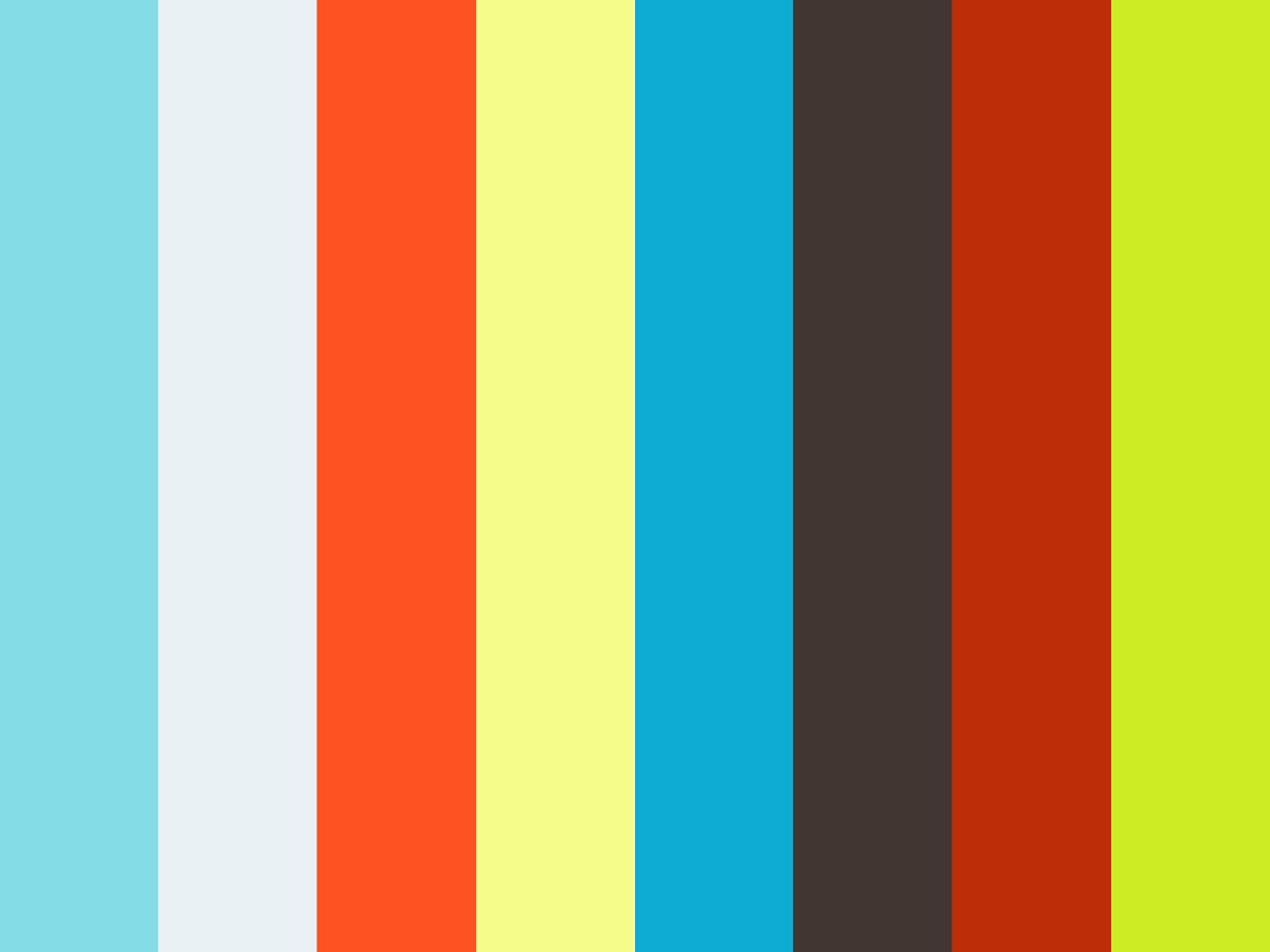Learn about how we’re activating Pegasus Plaza in Downtown Dallas along with our partner, Downtown Dallas, Inc.
Read MoreActivating Vacancy Downtown Dallas Recap
For the Activating Vacancy Downtown Dallas, a National Endowment for the Arts-supported project in partnership with Downtown Dallas, Inc., two artist teams worked with community members to create works of public art to activate spaces in Downtown Dallas. Through a call for proposals, artists were tasked with devising a project in response to public space priorities, identified through our Community Audited Public Space (CAPS) process and a Community Advisory Committee. Two series of works were created through a community-engaged process: the WonderPhones and MAY I // a blessing project. Project teams engaged with community members through a variety of workshops and community gathering events, which included project tours and a culmintaing public interview with the artists.
WonderPhone
The WonderPhone is an interactive payphone that connect the people in downtown Dallas to the city and each other. The team combined old and new technology to allow people to listen to content and play and record their stories. Five WonderPhones were created, placed in colorful enclosures in various locations downtown and popping up at events.
The WonderPhone team (Rickey Crum, Gray Garmon, Katie Krummeck, Edward Li, and Justin Childress) worked with local high school students, architects, historians, designers, urban planners, musicians and essayists to create and record engaging Dallas- or phone-related content for participants to enjoy. Audio content ranged from personal stories of memories downtown to future imaginings of new possibilities for Downtown, as well both curated and newly created pieces that focus on the history and architecture of downtown Dallas. Interactive prompts ask participants to share reactions to specific questions (and hear responses live) as well as follow instructions to participate in immersive experiences exploring downtown.
The artists said, "We hope that the WonderPhone will inspire participants to listen and think deeply about the lived experiences of the citizens of Downtown Dallas as well as engage participants in activities to help them observe Dallas in a new light and reflect on their own participation in the city."
MAY I // a blessing project
MAY I // a blessing project is a walkable installation of blessings written by local young women for the Dallas community, manifested large-scale. The artists Ruben Carrazana and Janielle Kastner worked with a group of young women (ages 12-18) who wrote specific declarations of hope for themselves (MAY I), for their community (MAY WE), and for their spaces (MAY THIS SPACE).
The team issued an exhortation to the city: "We believe these young women don’t need us to 'empower' them, they need us to acknowledge they already have the power to speak life into their community. We call these declarations blessings as they begin with the word 'may' - a word that summons into existence that which isn’t here yet. Our work as artists has been taking their words and manifesting them in unexpected places downtown in a bold, surprising, even defiant manner. In a world that asks them to shrink, MAY I radically insists young women take up extraordinary amounts of space. We encourage you to join these young women and manifest your own blessing in your spaces, tagging #mayiblessdallas."
Our partner DDI will continue to use the artworks to activate spaces in downtown Dallas. Check out photos of the artworks and the AVDD events below!
This project was supported in part by an award from the National Endowment for the Arts (NEA). To find out more about the National Endowment for the Arts visit www.arts.gov.
To find out more about our project partner Downtown Dallas Inc., visit www.downtowndallas.com.
Rural Placemaking Peer Exchange in Thomas, WV
Learn more about our work Activating work!
On October 3rd and 4th, [bc] co-hosted a peer learning exchange with the Housing Assistance Council and Woodlands Development Group in Thomas, West Virginia to share knowledge and best practices for creative placemaking in rural communities. The peer learning exchange included a range of site visits, conversations with local stakeholders, and workshops.
[bc], HAC and Woodlands were joined by rural affordable housing developers, artists, educators and local nonprofit organizations to discuss topics including funding, partnerships, program design, cultural equity and community engagement.
This project is supported in part by an award from the National Endowment for the Arts. To find out more about how National Endowment for the Arts grants impact individuals and communities, visit www.arts.gov.
Artists Selected for Activating Vacancy Downtown Dallas!
[bc] is excited to announce the selection of two artist teams for Activating Vacancy Downtown Dallas, the duo Janielle Kastner and Ruben Carranzana, and a collective formed by Rickey Crum, Gray Garmon, Katie Krummeck, Edward Li, and Justin Childress. We're excited to spend the next few months working with them and the stakeholders of downtown Dallas to create exciting and fun works of art that challenge current notions of "public space" downtown. Please join us on Saturday, August 19th, 3 pm - 6 pm at 416 S Ervay, for a mini-block party to meet the artists and talk to them about their proposals. If you can't make it this week, we'll be having a presentation and feedback session the following Saturday, August 26th, 1 pm - 3 pm at 416 S Ervay. Read on for more information about the selected artists and their project proposals!
Ophelia Underwater. Features Zoe Kerr, photograph by Carson McCain Gray
Janielle Kastner and Ruben Carranzana: Janielle Kastner is a writer, actor and performance deviser, whose social engagement work centers around the role young women play in shaping their communities, and vice versa. She was recently named Best New Playwright 2016 (Dallas Observer), and her plays include OPHELIA UNDERWATER (The Tribe, L.I.P. Service), FEED ME (Stella Adler Theatre/Playworks) and HEAVEN’S GATES, HELL’S FLAMES. Her social engagement work includes: PROJECT: BLESSING, one-on-one performance art, and PROJECT: GIRL, a trans-media installation based on interviews with young women from disparate communities. Additionally, she co-runs Dallas cult classic Shakespeare in the Bar. She holds BAs in Theatre & English from Southern Methodist University.
Shots Fired. Image courtesy of Cry Havoc Theatre
Ruben Carrazana is a local actor, director, and teaching artist. He co-directed SHOTS FIRED, a show exploring the Dallas police shootings with local youths. Ruben directs and assistant directs for JESTERS, theatre and film created and performed by adults with special needs. He has performed locally with Second Thought Theatre, Danielle Georgiou Dance Group, Dallas Theater Center, Undermain Theatre, Stage West, and Cara Mia Theatre. His play STACY HAS A THING FOR BLACK GUYS was recommended for the American Theatre Critics Association/Harold and Mimi Steinberg New Play Award, and his play SHE was awarded an Honorable Mention from the Southwest Playwriting Festival. He holds a BFA in Theatre from Southern Methodist University.
Together, Janielle and Ruben are two of the co-founders of performing arts incubator The Tribe, for which they were named 2016 Dallas Masterminds (Dallas Observer).
Project Proposal:
Together, Janielle and Ruben will transform an outdoor space in downtown Dallas, repurposing it with giant, individual, original blessings written by young women in the Dallas community (ages 12-18). First, they will draw upon their devising experience and lead young women through the creative process of writing a “blessing” for their city (a short, powerful, irreligious but specific declaration of hope). Then, they will work with community partners to determine an appropriate outdoor route. Finally, the project will culminate as a walkable installation of 8-10 aesthetically unified pieces, starting and ending with blessings projected onto buildings a few blocks from each other, with transformed “blessed” objects to be found along the way (ie. large text painted on a bench, length of sidewalk, dumpster, etc). Since young women are often taught to take up less space, projecting their words large-scale onto community spaces is a radical, inherently subversive act. Rather than seeking to “empower” young women, these pieces assert that young women already possess the requisite power to speak life into their community. As a result, the installation both realizes local young women’s visions for their city’s future, and designates a walkable space in an otherwise unwalkable city.
Mod Pod
Rickey Crum, Gray Garmon, Katie Krummeck, Edward Li, and Justin Childress: The artist team is a collective of designers from a variety of backgrounds (architecture, human-centered design, graphic design, engineering, and education) with experience working all over the world on projects of various scales. The diverse backgrounds of the team members allow them to bring an interdisciplinary perspective to design challenges, and the nature of their work has given them the platform to use creative expression and human-centered design methodologies for social impact. The whole team (Rickey Crum, Gray Garmon, Katie Krummeck, Edward Li, and Justin Childress) are all affiliated with the Design and Innovation programs (like this and this) at Southern Methodist University in Dallas, TX.
Project Proposal:
We propose to create an installation of “redesigned” payphones at various public spaces in downtown Dallas. The payphone, although antiquated, can be digitally altered with new technology and pivot to be a vessel for connecting people with their city. We will work with the downtown community to understand their needs, interests, and stories to help design the payphone interactions. As a passive listener or an active contributor, people will have the ability to choose the way that they want to engage with the installation. Ultimately, this installation aims to inform people about their city, suggest ways to experience their city, inspire deeper connections between people, and encourage them to participate in the future of their city by sharing their voice.
The internal systems of the payphone will be altered with new digital technologies to allow for the keypad to provide a series of audio interactions. When a person interacts with the payphone by picking up the receiver, they will be greeted with a message that prompts the user to engage in different activities. For instance, the user might be prompted to hear the history about a nearby building, or a historical event. An informational option could provide recommendations on local dining or entertainment offerings. They can press a number that asks the user a question about their opinion on a current civic topic and records their response. There could be an option to leave recorded stories that others can listen to and share then personal experiences.
These projects are part of [bc]'s Activating Vacancy initiative. Activating Vacancy is an art and public interest design initiative where residents work alongside artists and designers to investigate, strengthen, and share a community’s unique history; engage in the development of a physical and social framework for cultural activities; and plan for the renewal and growth of the neighborhood. Collaborations included art installations, performances and other artistic actions that explore the cultural, social, political and economic life of a neighborhood.
This project is supported in part by an award from the National Endowment for the Arts. To find out more about how National Endowment for the Arts grants impact individuals and communities, visit www.arts.gov.
Additional support is provided by Downtown Dallas, Inc.
Announcing Activating Vacancy Downtown Dallas Call for Proposals
buildingcommunityWORKSHOP, with Downtown Dallas Inc, is excited to announce Activating Vacancy Downtown Dallas’s call for artist proposals. Artists are invited to submit applications for this project that asks artists to create create work that directly addresses issues identified by downtown stakeholders through a previous process called Community Audited Public Space (CAPS), as well as by a Community Advisory Committee.
Read MoreRural Placemaking Participant Selection
See more posts about Activating Vacancy and our work in D.C.
[bc] and the Housing Assistance Council (HAC) are pleased to announce the selection of two organizations for our Rural Placemaking Program, supported by a Knowledge Building Grant from the National Endowment for the Arts (NEA). The smART Kinston City Project Foundation in Kinston, North Carolina and Woodlands Development Group in Elkins, West Virginia will be implementing rural creative placemaking initiatives during summer 2017 as a part of this program.
The smART Kinston City Project Foundation has been working to foster the development of an arts-driven and asset-based economy by cultivating an Arts and Cultural District in Downtown Kinston for the last two years. smART Kinston focuses their initiatives on connecting individuals and communities, using art as a tool to address local infrastructure and regional economic challenges. Their pilot project will partner artists with local stakeholders to develop a creative placemaking project that addresses racial tensions and economic inequity in this city of 21,000.
Woodlands Development Group is a certified Community Housing Development Organization that has been working in Elkins, West Virginia and the surrounding area since 1995. For this initiative, Woodlands will partner with ArtSpring to implement a creative placemaking initiative in Thomas, West Virginia - a town with a population of 600. ArtSpring, a nonprofit that nurtures the arts community, has worked since 2011 to engage the public and promote Tucker county as an arts destination by presenting an annual arts festival. Woodlands and ArtSpring will use community input to develop public art and wayfinding installations that reflect the artistic assets of the region and highlight the quickly developing cultural identity of Thomas.
Over the next six months, smART Kinston and Woodlands Development Group will work in partnership with residents and artists to develop a creative, arts-based initiative in their communities. With the support of [bc] and HAC, both organizations will kickoff their creative placemaking pilot projects in June.
The project is funded in part by an award from the National Endowment for the Arts (NEA). To find out more about how the National Endowment for the Arts grants impact individuals and communities visit www.arts.gov.
Downtown Dallas Community Audited Public Space (CAPS)
Join [bc] and Downtown Dallas, Inc. for a Community Audited Public Space (CAPS) exercise. Use your knowledge and skills to gather vital information on the quality of sidewalks and streetscapes which will help inform planning efforts in downtown.
On the morning and afternoon of Saturday, March 25th, volunteers will work alongside [bc] to explore the heart of downtown Dallas through a series of data gathering activities. On Saturday, April 1st, [bc] will lead designers, engineers, and planners to audit some of the most complex spaces in downtown, focusing on the areas that bridge between the inside and outside of the downtown “loop”. During these events, we will record the physical condition of downtown’s public realm focusing on the sidewalks, their width, materiality, amenities and their interaction with the street.
Public knowledge is indispensable in understanding the experience of place within the city. CAPS will reinforce the community led advocacy already taking place in downtown and will also help develop tools and strategies for documenting and addressing issues in downtown's public spaces and sidewalks. The results will aid in neighborhood efforts to
- Advocate for high quality public spaces
- Enhance public safety through street and sidewalk treatments
- Enhance the public realm through the addition of active public spaces
- Provide community driven, qualitative analysis to supplement quantitative measurements of downtown
- Increase collaboration between community members
During each of these audits, participants will start by running through a CAPS training followed by small groups assignments to complete the audits. Facilitators will lead each small group through several blocks, gathering opinions and data on the sidewalks and streetscapes of the area. With the facilitator's guidance, auditors will record the physical condition of downtown's public realm focusing on the sidewalks, their width, materiality, amenities and their interaction with the street.
We are calling all volunteers to join us in auditing the city on March 25th and April 1st. Additionally, we are looking for facilitators to lead the auditing groups on March 25th. Three trainings will be held before the community event for those interested in acting as a facilitator for small groups of volunteers. If you are interested in being a facilitator, please sign up for one of these dates: February 25th, March 2nd, and March 4th.
This initiative is supported in part by Downtown Dallas Inc. (DDI) and an award from the National Endowment for the Arts (NEA). To find out more about the National Endowment for the Arts visit www.arts.gov. To find out more about Downtown Dallas Inc., visit www.downtowndallas.com.
Rural Placemaking Call for Participants
See more posts about our Activating Vacancy work.
[bc], with HAC, is excited to announce the launch of the call for participants for Rural Placemaking, a new creative placemaking initiative that will take place in two rural communities (with populations less than 50,000) in the United States. Creative placemaking is a way of working between community developers, housing organizations, artists and local stakeholders to strengthen communities. This initiative will implement two creative actions during summer 2017 that bring people together to share food, stories, art, experiences, and histories as well as enable neighbors to talk, learn, and organize.
Two partnerships between a housing or community development organization and an artist/art organization will be selected to implement a temporary initiative from May to August 2017. [bc] and HAC encourage housing/community development organizations without an existing artist/arts organization partner to submit an application. If successful, [bc] and HAC will facilitate selection of a partner artist/organization.
Successful applicants will receive up to $7,500 to support the development of an arts and community building project in their town. They will also receive training and support from national leaders in creative placemaking and community development on the implementation of their project. Throughout the Rural Placemaking program, [bc] and HAC will provide one in person peer-to-peer training session with other participants to share experience and problem solve, technical training webinars to guide participants through [bc]'s creative placemaking process, Activating Vacancy, and an on-site visit to assist in program implementation. [bc] will provide guidance and feedback to participants on creative placemaking throughout the implementation of Rural Placemaking. HAC will provide organizational and technical assistance in sustaining long term impact throughout the implementation of Rural Placemaking.
Applicants should demonstrate a strong interest in social justice and desire to work collaboratively with community stakeholders to formulate proposals which unite residents from diverse economic and cultural backgrounds. Applicants are encouraged to share examples of past work that exhibit community engagement/participation and the organization’s interest in bringing creative placemaking to their community.
More information on Rural Placemaking can be found here. Interested parties should apply via an online application here. We recommend reviewing the application requirements on pages 4-6 on the call for participants to prepare your materials prior to submission. Applicants cannot save and return to their applications.
Applications are due by 11:59pm on March 10, 2017. Applicants are encouraged to submit outside of peak website traffic time, (8:00pm-11:59pm CST on March 10th, 2017). Finalists will be notified by March 30, 2017.
This initiative is supported in part by an award from the National Endowment for the Arts (NEA). To find out more about how National Endowment for the Arts grants impact individuals and communities, visit www.arts.gov.
Abriendo Las Puertas
On December 3rd, Activating Vacancy Arts Incubator will celebrate the work of Artist in Residence Celeste De Luna, Rigoberto Gonzalez and Nancy Guevara and the future of arts, culture and civic engagement in Historic Downtown Brownsville.
De Luna’s large scale wood-cut prints about resistance and rebellion in the valley will be displayed throughout the Historic Market Square. Her works include portraits of the Buffalo soldiers, Americo Paredes and visualizations of corridos written by Brownsville residents. Guevara will display two large fabric murals made of ropa usada that portray female grassroots activists from the Valley. Gonzalez will reveal a 14 foot long movable mural to be displayed in the street, that addresses challenges experienced by the homeless in Brownsville.
Additional programing will include live music performances by Caldo Frío, photographs from the Taquerías of Southmost exhibit, , produced by Texas Folklike and the Brownsville Historical Association and the dance, #soyBrownsville, choreographed by Caty Wantland. Screen printing workshops will be held by Nancy Guevara and Celeste de Luna throughout the event. All programing is free and open to the public.
Activating Vacancy Arts Incubator is an art and public interest design initiative in Market Square in Historic Downtown Brownsville. Artists collaborate with community members to create art that explores the cultural, social, political and economic life in this region. The project is supported in part by an award from the National Endowment for the Arts, the City of Brownsville and BCIC and produced by buildingcommunityWORKSHOP.
For more information on AVAI or Abriendo Las Puertas follow up on Facebook!
Celebrating Ivy City Is...
Learn more about Crossing the Street: Ivy City and our work in DC.
Photos by Vinnie Accardi (top left), Lotanna Obodozie (top center-right) and Nando Alvarez (center and bottom rows).
On Sunday, November 6th, we celebrated the opening of “Ivy City Is…”, a collaborative, resident and artist-led creative project that culminated in the creation of a three-dimensional, 5’ by 20’ screenprinted, plywood installation, spelling out “IVY CITY”. This project is intended to celebrate the neighborhood’s rich heritage and foster a dialogue about Ivy City’s identity in the face of rapid development and demographic change. Over 200 Ivy City residents, creatives, and community stakeholders joined us at this event with on-site screen printing, free t-shirts, food, and performances by local artists at Lewis W. Crowe Park.
Each letter was crafted using a collage of historic photos, maps, and portraits of residents who customized individual yard signs declaring what Ivy City means to them. A diverse community of local artists collaborated with area youth to host a series of free screen printing workshops, where residents learned how to screen print and helped create the seven large letters that spelled out “IVY CITY”. Prior to this celebration, these individual letters were on display in key locations throughout the neighborhood, including Bethesda Baptist Church, Louis Carryout, Hecht Warehouse, and Trinity Baptist Church.
This “place-keeping” installation serves as a landmark to the historic neighborhood and invites residents of all backgrounds to celebrate Ivy City and collectively envision its future. This project is a collaboration between Empower DC, The Sanctuaries, Open Studio DC, LISC, [bc], and the DC Office of Planning (DCOP). This project is supported by DCOP’s grant from the Kresge Foundation, “Crossing the Street: Building DC’s Inclusive Future through Creative Placemaking”.
Ivy City Artist Selection
See more posts about Crossing the Street and our other work in Washington, DC.
The Sanctuaries artists and Empower DC youth community organizers screen print yard signs for residents. Photos (above and below) by Rev. Erik Martinez Resley of The Sanctuaries.
[bc] with LISC is excited to share the proposal selected for the Crossing the Street: Ivy City project. Crossing the Street: Ivy City is a temporary creative placemaking initiative in northeast Washington, DC. The collaborative team of EmpowerDC , The Sanctuaries, Open Studio DC and resident Taylor Johnson have already been hard at work engaging residents in conversations about Ivy City's neighborhood identity and the community's desire for recreational amenities. Their project invites new and old Ivy City residents to customize a sign that expresses what "Ivy City Is" to them as well as to participate in a screenprinting and poetry workshop. The photos of residents with their signs, the poetry developed, and other curated images will be used to develop a large, screen printed installation. This installation will be unveiled at a community event on Saturday, October 29th. Be sure to stay connected with us on Facebook for future updates and opportunities to participate!
AVAI Artist Proposals
Playing with Production: Walking tour
Photo by Elaine Morales
[bc] is excited to share the project proposals for our three Activating Vacancy Arts Incubator Artists-in-Residence. Celeste De Luna, Rigoberto Gonzalez and Nancy Guevara have been hard at work in their studios and throughout the city of Brownsville; meeting local stakeholders, longtime residents, historians and academics. In June & July, they synthesized the knowledge they have collected to generate an exciting series of proposals for projects for the City of Brownsville.
Their projects will unfold from August through November. Learn about each artist’s projects below and join in the workshops and programming that they have designed over the upcoming months. Be sure to stay connected with us on Facebook for future updates and opportunities to participate in forthcoming events!
Celeste De Luna (R) sharing her prints and collecting stories about Brownsville with an attendee at Playing with Production, Photo by Tom Hill
Celeste De Luna’s project will center around historical and contemporary narratives of strength and resistance native to the Rio Grande Valley. Over the past months she has identified central figures from Brownsville history, including Americo Paredes and Juan Cortina. In partnership with members of the community, she will work to identify how local stakeholders connect with their stories and collaborate with them to generate visuals representing their own stories of protest.
De Luna will conduct a series of workshops beginning in August that will include a steamroller printing workshop, a storytelling workshop and a kite making workshop in Lincoln Park. In November she will exhibit 5 large scale prints representative of the stories shared with her by local residents and the history of the region. Prints from the large woodcuts will be wheatpasted throughout the downtown and the final carved blocks will be exhibited at the conclusion of the residency.
Rigoberto Gonzalez (L) speaking with an attendee and collecting stories about Brownsville with an attendee at Playing with Production, Photo by Tom Hill
Rigoberto Gonzalez will work over the upcoming months on a large scale, moveable mural based upon a series of interviews he will conduct with Brownsville residents. As a longtime resident of the Rio Grande Valley, he is particularly interested in the cultural traditions of the region and the stories that accompany them. At the recent AVAI Open Studio event, Playing with Production, Gonzalez invited attendees to sketch their ideas for the mural and to share stories of their experiences downtown.
During his forthcoming workshops Gonzalez will hold personal narrative workshops to record oral histories and create portraits of the people whose stories he collects. The recordings will become sound installations to accompany Gonzalez’s murals in filling vacant spaces with the stories of Brownsville.
Nancy Guevara (center) speaking with an attendees at Playing with Production, Photo by Tom Hill
Nancy Guevara’s project, Intersections of Transformation on the Border will investigate the experiences that lead people to become activist leaders. Throughout the residency Guevara will work with local women and community leaders to create portraits using fabric from local ropa usada stores that reflect the leaders’ experiences of personal transformation, self-actualization and empowerment. By working closely with community leaders to create designs based on their experiences of struggle and complexity, Guevara hopes to engage aspiring artists and activists in using art as a tool for social justice.
Leading up to the presentation of these works to the public, Guevara will hold a series of workshops and discussions about catalyzing change and cultivation of leadership. Included in this series will be a manta workshop, in which participants will decide upon an issue that has deep personal importance to them and then make a banner representing a cause.
Playing with Production: Walking tour, Photo by Jesse Miller
AVAI will continue throughout the Fall and will culminate in mid-November with installations, performances and exhibitions throughout the month. Follow AVAI on Facebook for updates on the Activating Vacancy Arts Incubator, important information on our monthly events and more details about the artists’ upcoming workshops.
Activating Vacancy Fall Calendar
August
8/27 Rebel Corridos: Corrido Writing Workshop with Celeste De Luna
8/27 El Círculo de Mujeres: Manta Workshop with Nancy Guevara
September
9/24 Make your own Chingona Outfit: Costume Making Workshop with Nancy Guevara
9/24 Kites Sin Fronteras: Kite Making Workshop with Celeste De Luna
October
10/7 Day in the Neighborhood: Brownsville’s first 24 Hour Film Festival begins
10/8 Painting Class Part 1 with Rigoberto Gonzalez
10/8 Work it Out: Open Lab Q and A for 24 Hour Film Festival
10/22Painting Class Part 1 with Rigoberto Gonzalez
10/22 Films from 24 Hour Festival Screened in Collaboration with the First Annual Brownsville International Film Festival
10/29 Steamrolling to the Future: Steamroller and Printmaking Workshop with Celeste De Luna
10/29 Platica Mujeres Líderes en Brownsville with Nancy Guevara
November
11/5Painting Class Part 1 with Rigoberto Gonzalez
11/9 Noche de Filosofía y First Brownsville Story Share: A Brownsville Symposium
11/12 Steamrolling into the Future: Steamroller and Printmaking Workshop with Celeste De Luna
December
12/3 Abriendo las Puertas: Activating Vacancy Arts Incubator Bridge Event with Artist Exhibitions, Charrettes, Panel Discussions, Performances and Live Music
Crossing the Street: Ivy City
See more posts about our work in Washington, DC.
[bc] with LISC are excited to announce a call for collaborators for the Crossing the Street: Activating Ivy City project. This art and creative placemaking initiative in the historic Ivy City neighborhood of northeast DC will implement a temporary, creative action that promotes community building, reflects the neighborhood’s rich heritage, and declares residents’ vision for the future of Ivy City.
Crossing the Street: Activating Ivy City will be carried out over the next four months produced and curated by [bc] with LISC in partnership with the DC Office of Planning. [bc] and LISC believe collaboration of local and technical expertise is essential to quality placemaking.
Residents and artists, are encouraged to respond to the call for collaborators. If you have had a creative project in mind that will activate or inspire your neighbors or if you are a person who creates for a living and you want to do something creative and artistic in Ivy City then we want you to apply!
More information on Crossing the Street: Activating Ivy City can be found here and interested parties should apply via an online application found here. A neighborhood tour and Q&A session will be held on July 21st for applicants to familiarize themselves with Ivy City and the application process. We encourage you to attend this session. Applications are due by midnight on Thursday, July 28th. Finalists will be notified by Monday, August 1, 2016.
For more information on Ivy City, see these resources.
This project is supported by a Kresge Foundation grant awarded to the DC Office of Planning. To find out more about DCOP’s Crossing the Street initiative, visit: http://planning.dc.gov/page/creative-placemaking.
Welcome the new AVAI Artists-in-Residence!
We are excited to announce the selection of three talented and innovative artists-in-residence for the Activating Vacancy Arts Incubator (AVAI), an arts and public design initiative in downtown Brownsville. Over the next 6 months, artists-in-residence Celeste De Luna, Rigoberto Gonzalez, and Nansi Guevara will work with [bc] and the City of Brownsville to investigate, analyze and engage with downtown Brownsville through public artworks created in collaboration with local stakeholders. There was an overwhelmingly positive response to the call for artists and we thank all the talented individuals who applied. Read about our artists below and keep up to date with AVAI via our Facebook page.
Celeste De Luna is a painter/printmaker from the Rio Grande Valley, Texas. She received her MFA from the University of Texas Pan American in 2008. She has shown artwork in group exhibitions since 2007 in the various cities in the Rio Grande Valley of Texas, San Antonio, Houston, Austin, San Diego and Chicago. Additionally, De Luna’s work has been part of nationally and internationally exhibited printmaking portfolio projects. In 2013, her one person show “Nepantla: Art from the Four Corners of the Valley” at South Texas College in McAllen, Texas was part of the 2013 Texas Biennial.
“My work is a tool to understand and deconstruct oppressive paradigms in my physical/spiritual/psychic environment. The confluence of American and Xicano culture clash and sometimes harmonize in my work. My seemingly morbid interests go well with the death and despair of the border experience. Common themes in my work include migrant/border experiences of women, children, and families, Tejas landscape, and the spiritual struggle of conflicting identities. My practice is rooted in writing, drawing, carving, and taking photographs. At times, my process is like child’s play with props and collected objects. These things manifest themselves in drawings and eventually artworks that can be paintings, drawings, prints, or assemblage.”
Nansi Guevara is a Xicana artist and activist from Laredo, Texas. Her work is at the core of using her border and rasquache sensibilities to create decolonial public artwork alongside communities. In 2006, she moved to Austin, Texas to pursue a Bachelor's in Design from the University of Texas, where she focused on creating educational studio based experiences and educational resources for youth of color. Post graduation, she spent one year in Mexico City on a Fulbright, where she co-authored and co-illustrated a children's book for pediatric cancer patients that is now being used in the Hospital General de México Federico Gómez and Lurie Children's Hospital of Chicago. In 2013, she moved across the country to study Arts in Education at the Harvard Graduate School of Education. In the last two years, she has created three public art pieces with community members in the Boston greater area, that center the experiences of people of color in a way that is celebratory and creates a call to action. She is now reconnecting with the Texas/Mexico border and hopes to join residents of Brownsville to create meaningful work that is deeply resonant to them and their communities.
Rigoberto Gonzalez was born in 1973 in Reynosa Tamaulipas, Mexico, and currently lives in southeast Texas near the Rio Grande in the city of Harlingen. He holds a B.F.A. from The University of Texas at Pan America in 1999 and an M.F.A. from the New York Academy of Art in 2004. Gonzalez’s work has been exhibited at The Smithsonian’s National Portrait Gallery, Washington DC (2016), the Hå gamle prestegard, Norway (2015), National Museum of Mexican Art, Chicago, IL (2015), The Emma S. Barrientos Mexican American Cultural Center, Austin (2012), The Houston Art League, Houston (2012), The Stanlee and Gerald Rubin Center for the Visual Arts, El Paso (2011), Texas Biennial, Austin (2011), Las Cruces Museum of Art, Las Cruces, New Mexico (2010), Roswell Museum and Art Center, Roswell, New Mexico (2009), Harlingen Heritage Museum, Harlingen (2008), Casa de la Cultura, Reynosa Tamaulipas, Mexico (2006) and Richardson Art Gallery, The University of Texas at Brownsville (2005). Rigoberto A. Gonzalez has completed artist residencies at the Coronado Studios Serie XX Project Artist Residency, Austin (2013) Roswell Artist Residency Program, Roswell, New Mexico (2008/09) and Rancho del Cielo, University of Texas at Brownsville and Texas Southmost College (2004), and received grants from the National Association of Latino Arts and Culture (2009/10). He has been the subject of artist profiles on PBS, NPR, and Televisa.
AVAI kicked off on April 8th with an informative panel discussion between downtown community stakeholders, artists, building owners, and new bcFELLOW Christina Houle who will be working closely with the incubator. The panel discussed the history of downtown, how it has come to its current condition, and what opportunities and challenges the area faces and how the arts might address these issues. On May 6th, AVAI and the Brownsville Historical Association led community members on a tour of historic and vacant structures throughout downtown Brownsville.
Kickoff! Activating Vacancy Arts Incubator
Learn more about Activating Vacancy.
[bc] is excited to announce a kickoff for the Activating Vacancy Arts Incubator (AVAI), a new art and public interest design initiative in Market Square, the center of Historic Downtown Brownsville. This program will create a viable means for artists to thrive in a region where attaining basic needs can be a struggle. The incubator will provide a catalytic hub for Downtown Brownsville and the arts, creating a platform for artistic production and collaboration between artists and the community. AVAI begins Spring 2016 and is produced and curated by [bc] in partnership with the City of Brownsville.
Come hear about the new Activating Vacancy Arts Incubator and other exciting new initiatives happening in Downtown Brownsville. Share your downtown stories and help us envision the future of arts and culture in Downtown! We'll start off with a social hour, including some creative activities and refreshments, followed by a panel discussion with local artistic and cultural leaders.
where: 609 E 11th Street
when: friday, april 8th, 5pm social hour , 6pm panel discussion.
Call for Artists! Announcing the Activating Vacancy Arts Incubator
[bc] is excited to announce the launch of the call for artists for the Activating Vacancy Arts Incubator (AVAI), a new art and public interest design initiative in Market Square, the center of Historic Downtown Brownsville. This program will create a viable means for artists to thrive in a region were attaining basic needs can be a struggle. The incubator will provide a catalytic hub for Downtown Brownsville and the arts, creating a platform for artistic production and collaboration between artists and the community. AVAI begins Spring 2016 and is produced and curated by [bc] in partnership with the City of Brownsville.
Read MoreThe Second Annual Ark Festival: The History, Present & Future of Tenth Street
Learn more about Activating Vacancy.
Last year, as part of our Activating Vacancy initiative, artist Christopher Blay and [bc] collaborated with the Tenth Street Historic District community to produce the Ark on Noah Street. The Ark is a sculpture, a gallery, a museum and a symbol. When Christopher Blay created the concept of the Ark, a fundamental facet of the project was that it be reproduced yearly to keep art and culture active in the Tenth Street Historic District and to create an opportunity to celebrate, share and reflect on the neighborhood's history and the changes of the year.
On May 2, 2015, the Ark was again commemorated during the Second Annual Ark Festival, a gathering of the Dallas arts community and the Tenth Street Historic District that was even bigger and better than before! The festival featured a processional of residents with original artwork depicting the neighborhood's history and its growth since the Ark was last seen, a performance of the original Story Corners play "A Freeman Cries for the Future," a visit from the Dallas Zoo, and the return of the Neighborhood Stories: Tenth Street exhibit. There was also a small marketplace for neighbors and arts activities led by Oil and Cotton.
The Tenth Street Historic District is one of Dallas’ oldest neighborhoods and one of its few remaining freedmen’s towns, communities built by freed slaves following the Civil War. Despite being designated a landmark district by the City of Dallas in 1993 and being listed on the National Register of Historic Places in 1994, the neighborhood has lost population and housing stock at a rapid pace. It has also experienced a growth in crime and a deteriorating public image. In response to these challenges, [bc] initiated Activating Vacancy to encourage residents to reshape the vacancy in their neighborhood from blight to opportunity through a series of public art activities, beginning with the Ark on Noah Street.
Activating Vacancy existed at a nexus of creative placemaking, public art and community organizing. Inspired by similar initiatives such as the Heidelberg Project in Detroit and Project Row Houses in Houston, Activating Vacancy sought to set in motion the revitalization of an important historic community, provide commentary regarding an array of urban issues such as vacancy and historic preservation and encourage a democratization of exceptional art in Dallas in terms of audiences, geographies and producers. The Ark on Noah Street was an excellent first step towards achieving these goals. The Ark as a gallery featured artwork produced by neighborhood residents. The Ark as a sculpture artfully repurposed discarded materials from Tenth Street's historic homes into a monument and testament to its history. The Ark as a festival brought neighbors, artists, critics and art consumers together to meet each other, rediscover an often forgotten part of Dallas and imagine a city where any neighborhood can be recognized as a source of valuable cultural producers.
At the Second Annual Ark Festival, it was made clear that the Tenth Street Historic District still faces tremendous challenges. Homes have been repaired, while others have been demolished. Crime is tempered, but it persists. There is also evidence of renewed action in the neighborhood: dozens of attendees wore Operation Tenth Street t-shirts, representing a new, forward-thinking neighborhood organization that has secured grant funding for neighborhood improvement projects. The Greater El Bethel Missionary Baptist Church has been repaired and again opens its doors to song and prayer on Sunday morning. And, the Ark has been rebuilt, fuller and more refined than its previous iteration.
In addition to the above challenges, there are a bevy of questions that have yet to be answered about the neighborhood that will help illuminate how sustainable its recent burst of energy is. Will Tenth Street be able to continue its revitalization with reduced non-profit activity? What will it take for Tenth Street to develop market interest in rebuilding its historic ground? Have recent efforts sufficiently demonstrated the neighborhood's value to the city at large to insist on its survival, whether through ongoing preservation efforts or through continued nurturing of its unique identity and role as cultural producer? Perhaps some of these questions will be answered and shared at the Third Ark Festival.
Tenth Street Sweep Video
Learn more about Activating Vacancy and POP Dallas.
Tenth Street Sweep
Read all the Activating Vacancy posts, and learn more about POP Dallas.
The final event of the Activating Vacancy initiative was the Tenth Street Sweep, a physical audit of the neighborhood. Community members, volunteers, and artists collected data to establish a baseline for neighborhood health. They also recorded the conditions of streets, sidewalks, vacant lots, historic structures, street lighting, and several other aspects of the neighborhood identified by community members as potential sites for the audit. Information gathered will be used to propose, pursue and gauge positive growth and change in the Tenth Street Historic District. Participants used a smartphone app called rePhoto to take pictures and complete survey questions during the audit
Check out the images from the audit.
After a morning of hard work, we all gathered for a barbecue lunch at the American Care Academy. Thanks to Preservation Dallas, the The Life of Cities class at the UT Arlington School of Architecture, the 2000 Roses Foundation, Ruth West, the rePhoto team, and all the community members and volunteers who helped with the event!
Show Hill Biz Park
Read all the Activating Vacancy posts, and learn more about POP Dallas.
The Tenth Street Historic District was once a self-sufficient place, with a thriving micro-economy that supplied the community with jobs and goods. An intersection between art and economic development, the Show Hill Biz Park activated Show Hill, a streetcar stop and important retail site at 1401 E 8th Street, now vacant, with a pop-up market. The market featured vendors selling locally crafted goods. Vendors had previously completed a certification program designed to develop a small business model that will enable them to successfully bring their goods to market. In addition, the Show Hill Biz Park featured musical and sculptural tributes to the neighborhood’s cultural history. Show Hill Biz Park reinvigorated the latent economic potential of the neighborhood, exploring how local talent can demonstrate the potential for different kinds of commercial and cultural activity in the Tenth Street Historic District.
Many of the local vendors had short videos created as part of the program as well. Watch them below!
![[bc]](http://images.squarespace-cdn.com/content/v1/5248ebd5e4b0240948a6ceff/1412268209242-TTW0GOFNZPDW9PV7QFXD/bcW_square+big.jpg?format=1000w)
